#also watson describing himself as bohemian
Text
lol THIS ENDED UP BEING SO LONG but it's such a cute story opening that I had to draw Watson roasting Holmes's messiness for the newspaper and Holmes skillfully maneuvering his way out of having to do chores. It's all canon, even the indoor sharpshooting, except for the bit about the cold bath.
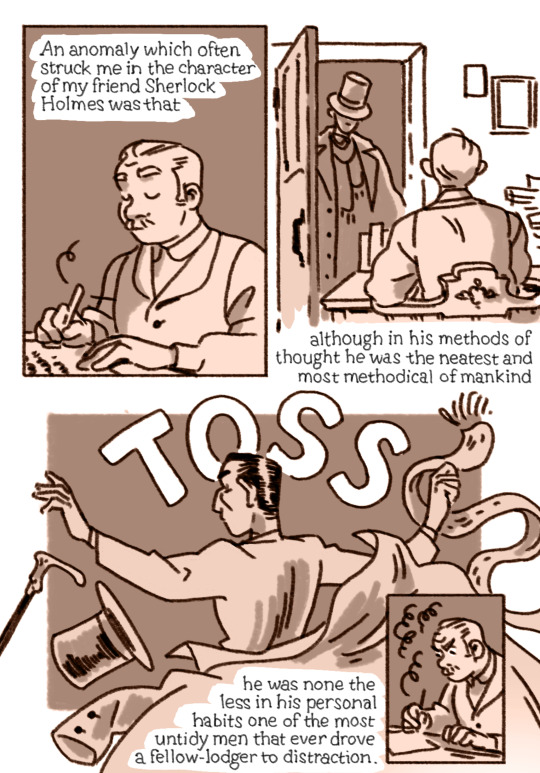
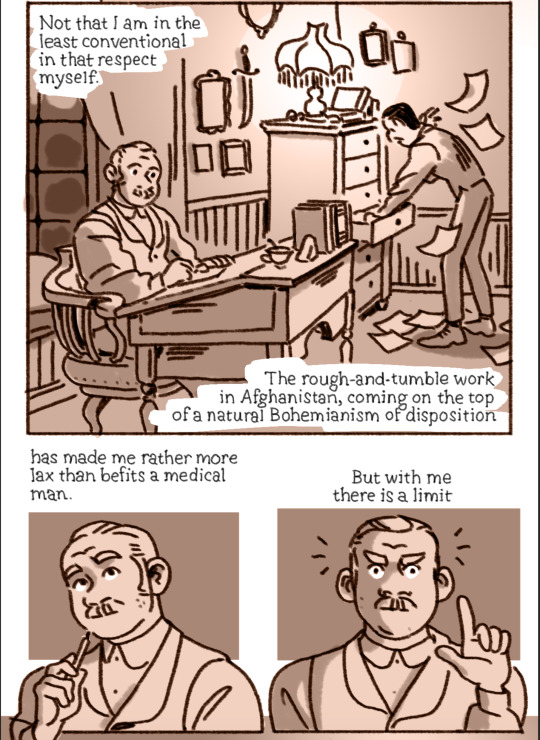
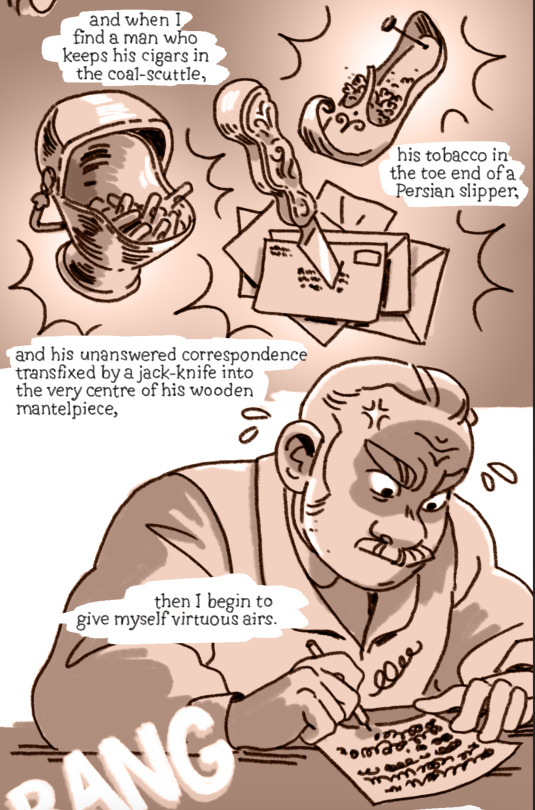
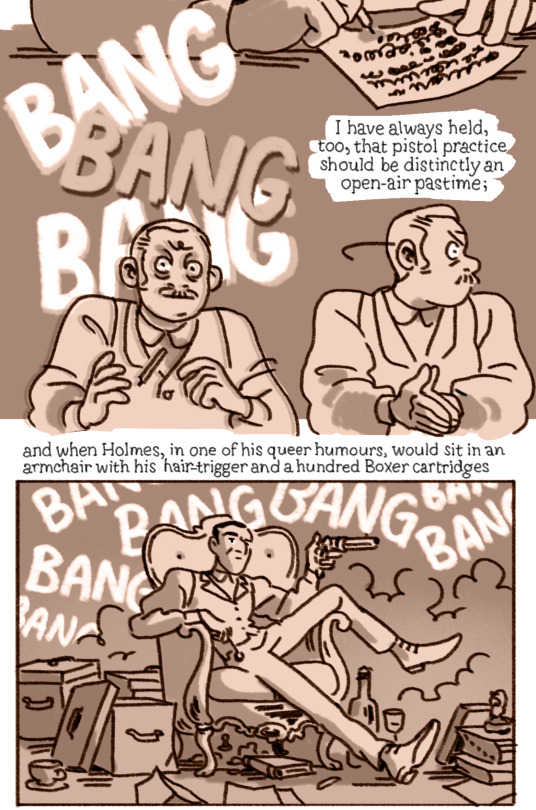
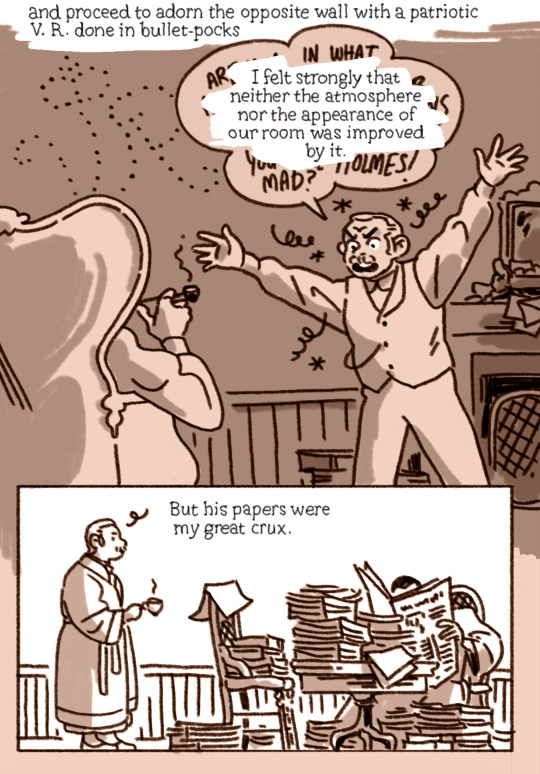
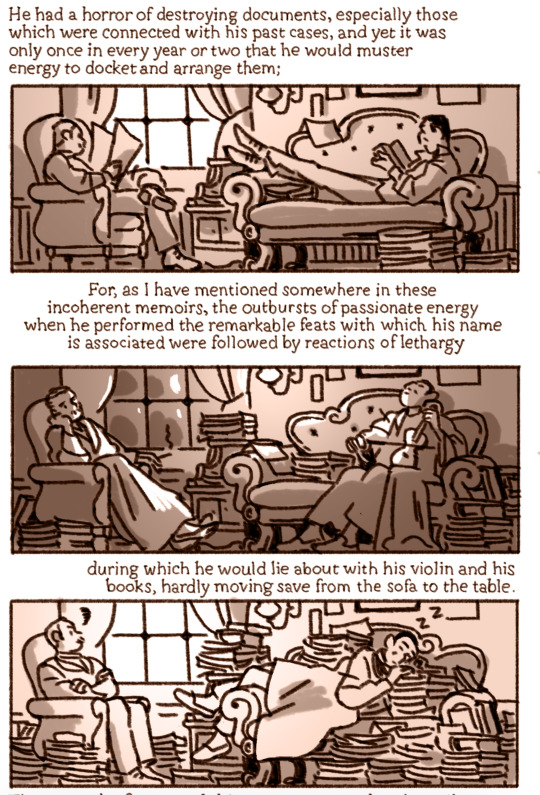
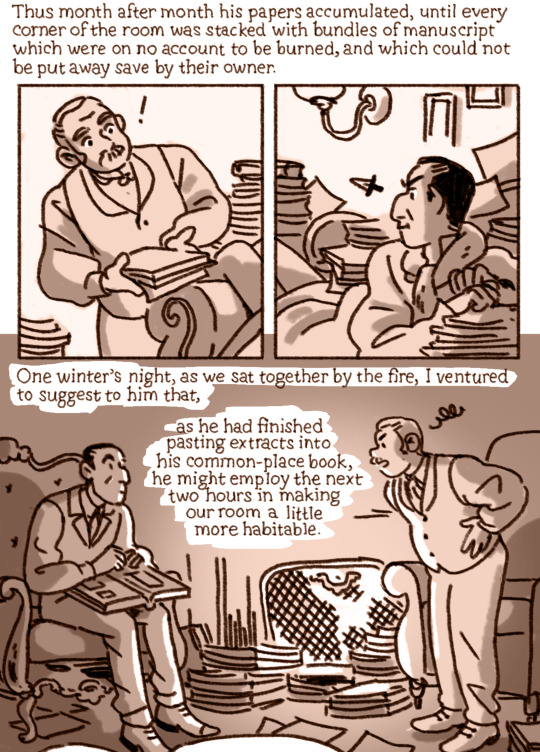
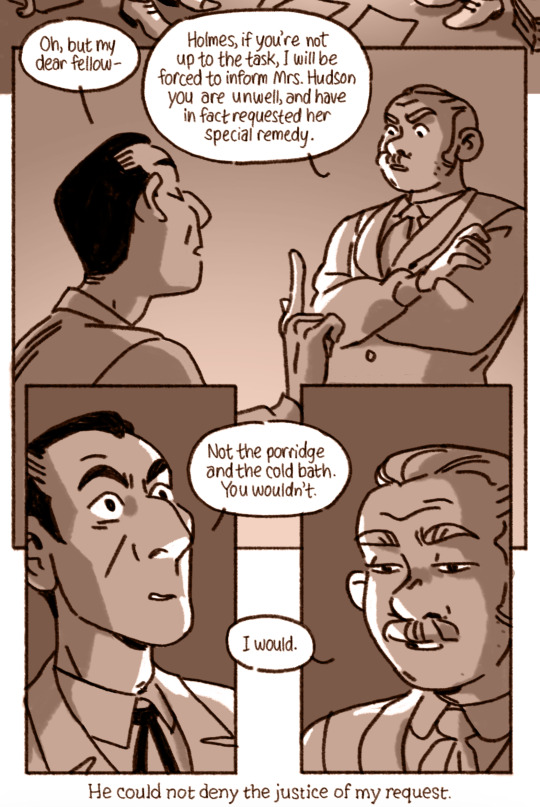
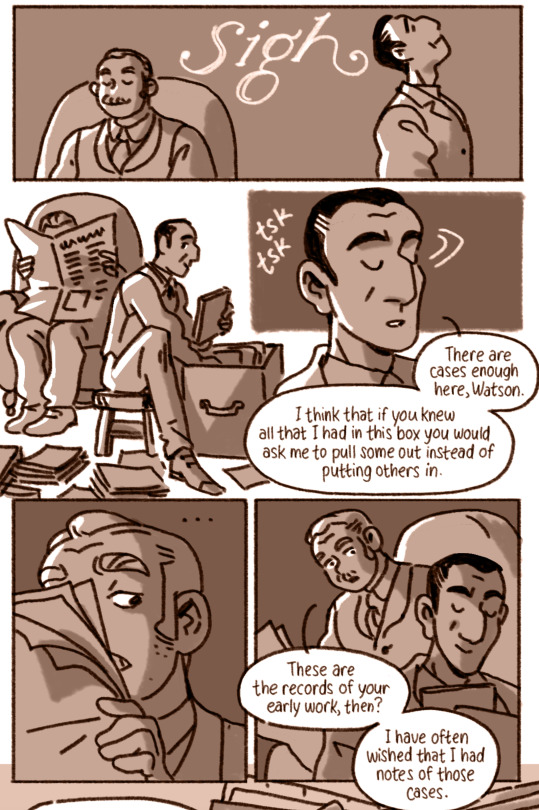
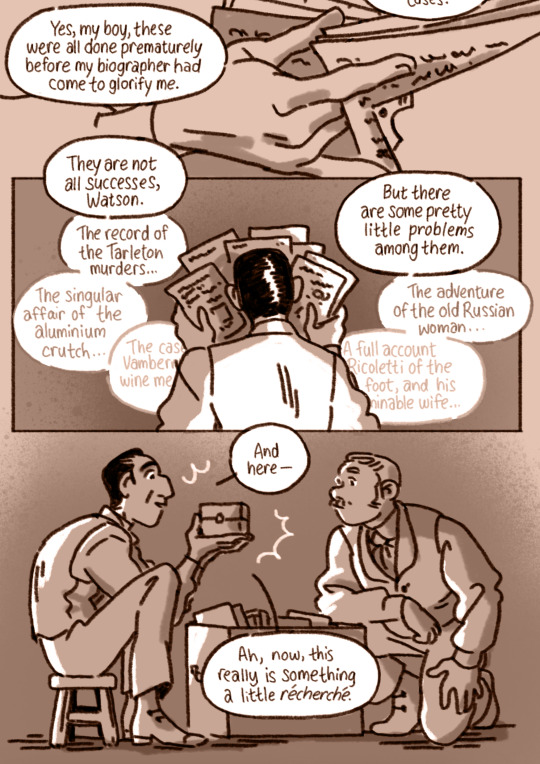
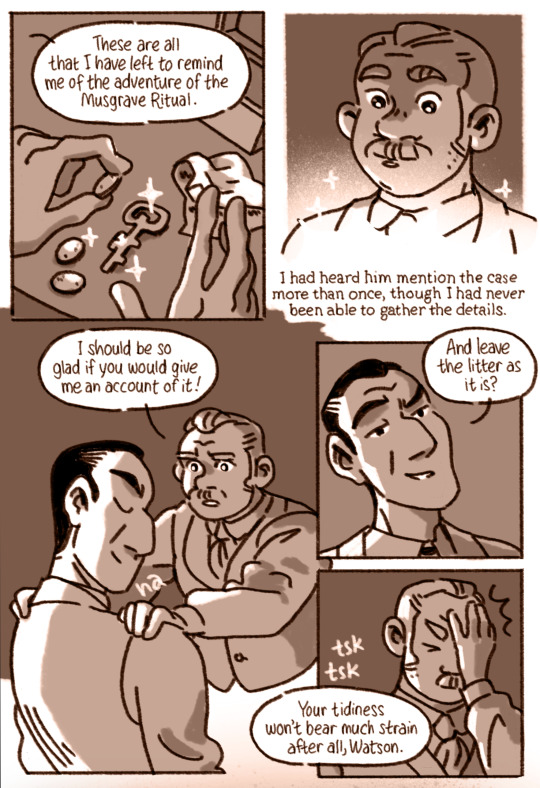
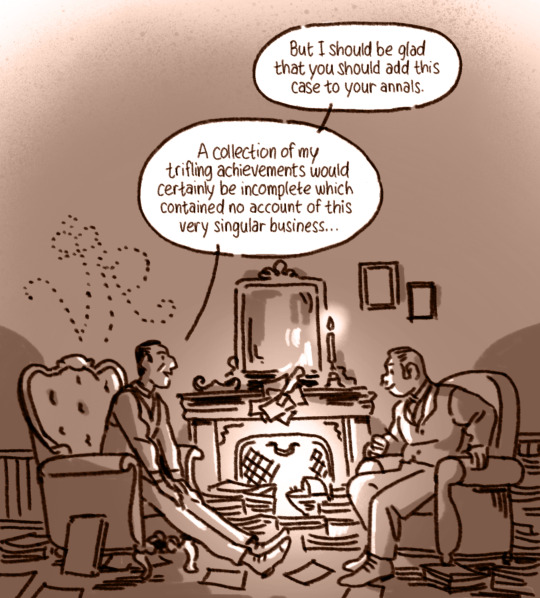
canon text under the cut:
An anomaly which often struck me in the character of my friend Sherlock Holmes was that, although in his methods of thought he was the neatest and most methodical of mankind, and although also he affected a certain quiet primness of dress, he was none the less in his personal habits one of the most untidy men that ever drove a fellow-lodger to distraction. Not that I am in the least conventional in that respect myself. The rough-and-tumble work in Afghanistan, coming on the top of a natural Bohemianism of disposition, has made me rather more lax than befits a medical man. But with me there is a limit, and when I find a man who keeps his cigars in the coal-scuttle, his tobacco in the toe end of a Persian slipper, and his unanswered correspondence transfixed by a jack-knife into the very centre of his wooden mantelpiece, then I begin to give myself virtuous airs. I have always held, too, that pistol practice should be distinctly an open-air pastime; and when Holmes, in one of his queer humors, would sit in an arm-chair with his hair-trigger and a hundred Boxer cartridges, and proceed to adorn the opposite wall with a patriotic V. R. done in bullet-pocks, I felt strongly that neither the atmosphere nor the appearance of our room was improved by it.
Our chambers were always full of chemicals and of criminal relics which had a way of wandering into unlikely positions, and of turning up in the butter-dish or in even less desirable places. But his papers were my great crux. He had a horror of destroying documents, especially those which were connected with his past cases, and yet it was only once in every year or two that he would muster energy to docket and arrange them; for, as I have mentioned somewhere in these incoherent memoirs, the outbursts of passionate energy when he performed the remarkable feats with which his name is associated were followed by reactions of lethargy during which he would lie about with his violin and his books, hardly moving save from the sofa to the table. Thus month after month his papers accumulated, until every corner of the room was stacked with bundles of manuscript which were on no account to be burned, and which could not be put away save by their owner. One winter’s night, as we sat together by the fire, I ventured to suggest to him that, as he had finished pasting extracts into his common-place book, he might employ the next two hours in making our room a little more habitable. He could not deny the justice of my request, so with a rather rueful face he went off to his bedroom, from which he returned presently pulling a large tin box behind him. This he placed in the middle of the floor and, squatting down upon a stool in front of it, he threw back the lid. I could see that it was already a third full of bundles of paper tied up with red tape into separate packages.
“There are cases enough here, Watson,” said he, looking at me with mischievous eyes. “I think that if you knew all that I had in this box you would ask me to pull some out instead of putting others in.”
“These are the records of your early work, then?” I asked. “I have often wished that I had notes of those cases.”
“Yes, my boy, these were all done prematurely before my biographer had come to glorify me.” He lifted bundle after bundle in a tender, caressing sort of way. “They are not all successes, Watson,” said he. “But there are some pretty little problems among them. Here’s the record of the Tarleton murders, and the case of Vamberry, the wine merchant, and the adventure of the old Russian woman, and the singular affair of the aluminium crutch, as well as a full account of Ricoletti of the club-foot, and his abominable wife. And here—ah, now, this really is something a little recherchè.”
He dived his arm down to the bottom of the chest, and brought up a small wooden box with a sliding lid, such as children’s toys are kept in. From within he produced a crumpled piece of paper, and old-fashioned brass key, a peg of wood with a ball of string attached to it, and three rusty old disks of metal.
“Well, my boy, what do you make of this lot?” he asked, smiling at my expression.
“It is a curious collection.”
“Very curious, and the story that hangs round it will strike you as being more curious still.”
“These relics have a history then?”
“So much so that they are history.”
“What do you mean by that?”
Sherlock Holmes picked them up one by one, and laid them along the edge of the table. Then he reseated himself in his chair and looked them over with a gleam of satisfaction in his eyes.
“These,” said he, “are all that I have left to remind me of the adventure of the Musgrave Ritual.”
I had heard him mention the case more than once, though I had never been able to gather the details. “I should be so glad,” said I, “if you would give me an account of it.”
“And leave the litter as it is?” he cried, mischievously. “Your tidiness won’t bear much strain after all, Watson. But I should be glad that you should add this case to your annals, for there are points in it which make it quite unique in the criminal records of this or, I believe, of any other country. A collection of my trifling achievements would certainly be incomplete which contained no account of this very singular business.
-The Memories of Sherlock Holmes: The Musgrave Ritual
#they are so married#also watson describing himself as bohemian#i know what you are#sherlock holmes#acd holmes#acd canon#john watson#my art#musgrave ritual
2K notes
·
View notes
Text
Letters from Watson, Scandal in Bohemia
Case and Themes
We won't be doing crimes today, because... false accusations of attempted blackmail are not as interesting as the historical and fandom implications of this case.
What is Bohemia, anyway?
"Bohemia is a fantasy in your head." - Rent
(I promise the quote will be relevant, it's not just because I grew up a theater kid.)
Bohemia is a region part of the present day Czech Republic that is almost completely surrounded by Germany. It's capital is Prague, which is known for a variety of arts and history reasons, from holy roman emperors and defenestrations to being the home of several classical composers and a hub of science during the renaissance and immediately after.
Politically, in 1888 or 1889, Bohemia would have been a portion of Austria-Hungary. A large and politically confusing third portion that had recently (1871) failed to achieve a position of equality for their monarchs with the co-ruling and ostensibly equal nations of Austria and Hungary. A king (or other major noble) of Bohemia would not have direct political power, but may have social notoriety, property, or money. Since I've proposed fictionalization for this story, I should note that "Ormstein" may not actually be a member of the bohemian nobility, but lacking other evidence, we must assume that he is notable, noble, and of more social than political power, wherever he's actually from.
Differences between "Bohemian" and Bohemia
La Boheme, the 1896 opera that Rent is inspired by, shows that by the late 1800's "Bohemian" was synonymous with socially unconventional artists and intellectuals, whether they were in Paris or Bohemia itself. Whether that was expressed in political views, art, free love [a concept originated in the 1800's and repolarized during the 1960's], or in the musical Rent, specifically relating to queer people.
When Watson refers to Holmes' "bohemian soul" he's deliberately referencing a wealth of history of arts and sciences and the colorful figures surrounding them.
Bohemian is also a description that was applied to Oscar Wilde, leading some Sherlockians to posit that it is a tacit acknowledgement that Holmes is not straight. Combined with the opening to Scandal, it is not a stretch, textually. Many people have, allonormatively in my opinion, extrapolated from a lack of love for women that Holmes is gay, my read has always been that this refers to a lack of either romantic love or sexual attraction, or both, and that Holmes is Aroace. Either way, it's an impediment to Baring-Gould's fanon that Holmes and Adler had an affair, especially when one considers how many knots he tied himself into to avoid Watson's dates ever being even slightly inaccurate. Either the text is fallible or it's not, Baring-Gould!
The description of bohemian may also apply to Irene. People who were described as bohemian were often writers, artists, actors, and musicians - like Irene Adler. Her description as an "adventuress" is not simply a feminine form of adventurer, or an adventurous woman, but implies that she's unscrupulous: scheming for wealth or social advancement via her romantic connections to men. Not merely a mistress, which is shameful enough, but one who won't quietly get brushed aside at the conclusion of a relationship, perhaps one who, unlike Ormstein, believes that their relationship should not be dismissed by society as invalid because they're of different classes and not married. Or perhaps one who, contrary to Ormstein's and Holmes' assumptions, is entering into a marriage with more equal footing than most of her peers: she has no fear of her husband finding out about her prior relationship, after all.
#Letters from Watson#A Scandal in Bohemia#I'll catch up with Reigate later I'm just busy this week#bohemians#this was not meant to be partially about Holmes being Aroace#but it's Aro week#and that's my interpretation which is only slightly based on projection#like 5% or less projection#Okay at time of posting LAST week was aro week#in my defense this story did not conclude until the second to last day of it
26 notes
·
View notes
Video
youtube
Maxwell - Sumthin' Sumthin' (Official 4K Video) HAPPY BIRTHDAY to Gerald Maxwell Rivera, (born May 23, 1973), better known by his stage name Maxwell, is an American singer-songwriter, record producer, and actor. Along with fellow musicians D'Angelo and Erykah Badu, Maxwell has been credited with helping to shape what has been termed the “neo soul” movement that rose to prominence during the late 1990s.Early lifeMaxwell was born in Brooklyn, New York, the son of a Haitian mother and a Puerto Rican father. His mother grew up in a devout Baptist household in Haiti. Maxwell’s father died in a plane crash when Maxwell was three years old. The experience made him a deeply religious child, and during his childhood he sang in a Baptist church.CareerBeginningsAfter receiving a low-cost Casio keyboard from a friend, the Brooklyn, New York-native began composing music at age 17. Raised in the borough’s East New York-section, Maxwell’s previous musical experience included his beginnings as a singer in the congregation of his Baptist church, which had become an integral part of his life after the death of his father in a plane crash. Already a fan of what he described as “jheri curl soul”, which was the trademark of early 1980s R&B acts such as Patrice Rushen, S.O.S. Band and Rose Royce, Maxwell began to teach himself to play a variety of instruments. According to him, the R&B of the early 1980s contained “the perfect combination of computerized instrumentation with a live feel”, and that the genre’s dynamics later became lost due to the influence of hip hop on R&B. Despite facing ridicule from classmates for being shy and awkward, he progressed and continued to develop his musical abilities, and he also adopted the look of a more bohemian style outwardly in his clothing, growing long sideburns and letting his hair grow out wildly and combed in an extreme style, or sometimes putting his hair in long dreads.Initially influenced by early-1980s urban R&B, Maxwell progressed rapidly, and by 1991 he was performing on the New York City club scene. Maxwell was able to gain access to a 24-track recording studio and started to record songs for a demo tape, which he circulated among his friends. The demo engendered interest, and his official debut concert performance at Manhattan nightclub Nell’s drew a crowd. During the next two years, Maxwell wrote and recorded over three hundred songs and played frequently at small venues throughout New York City. Maxwell’s performances continued to draw interest and increase the buzz about him, and he was called “the next Prince” by a writer from Vibe magazine who attended one of his shows. After earning a considerable reputation, Maxwell signed a recording contract with Columbia Records in 1994. He adopted his middle name as a moniker out of respect for his family’s privacy.Maxwell’s Urban Hang SuiteMaxwell began working with songwriter Leon Ware and noted guitarist Wah Wah Watson to record his debut Maxwell’s Urban Hang Suite in the early 1990s. Recording sessions for the album took place in 1994 and 1995 at Electric Lady Studios, RPM Studios, Sorcerer Studios and Chung King Studios in New York City, and at CRC Studios in Chicago, Illinois. After production for the album was completed in 1995, the finished product was presented to Columbia Records in Spring of that same year. However, it was shelved for nearly a year, due to issues with Columbia’s management, the label’s extensive reorganization and record executives’ doubts of the album’s commercial potential.Initially, the album was slow to obtain commercial interest. On April 20, 1996, the album made its chart debut at number 38 on the Top R&B/Hip-Hop Albums chart. From August to October 1996, Maxwell’s Urban Hang Suite experienced chart growth on both the Top R&B/Hip-Hop Albums and Billboard 200, peaking at number eight on the former and at number 36 on the latter. It spent seventy-eight weeks on the Billboard 200 chart. It became a Top 30 hit in the United Kingdom. The album was later ranked as one of the year’s top-10 best albums by Time, Rolling Stone and USA Today. and was also nominated for a Grammy Award for Best R&B Album at the 39th Grammy Awards, losing the award to The Tony Rich Project's Words.The album spawned four singles. The first single released, “…Til the Cops Come Knockin’”, debuted on the Hot R&B/Hip-Hop Singles & Tracks at number 87 in May 1996. Peaking at number 79, the single spent 12 weeks on the chart. The second single, “Ascension (Don’t Ever Wonder)”, debuted on the Hot R&B/Hip-Hop Singles & Tracks in August 1996 at number 11, eventually peaking number eight. It spent eighteen weeks on the Billboard Hot 100, peaking at number 36 on September 28, 1996. The third single, “Sumthin’ Sumthin’”, peaked at number 22 on the Hot Dance Music/Maxi-Singles Sales. The album’s fourth single, “Suitelady (The Proposal Jam)”, entered the Hot R&B/Hip-Hop Airplay component chart in May 1997, peaking at number 64. (Maxwell contributed the song “Segurança (Security)” to the AIDS-benefit album Red Hot + Rio, produced by the Red Hot Organization.)Despite only having released only one album, the music video television channel MTV saw his burgeoning popularity and asked him to tape an episode of the concert series MTV Unplugged in New York City. The show was taped live on June 15, 1997, and he performed his own songs as well as covers of songs by Kate Bush (“This Woman’s Work”) and Nine Inch Nails (“Closer”). (Unfortunately he clashed with his label about the release of a full album of his session, resulting in the release of only an extended play, or EP instead, containing seven songs.) The episode of MTV Unplugged first aired on the network on July 22, 1997".Embrya and NowMaxwell’s second studio album, Embrya, was released in early 1998, and upon its release it was panned by contemporary music critics. The album received mixed criticism for its more “indulgent sound.” With its internal focus and esoteric grooves, the album served as a departure for Maxwell, who did not regret risking his reputation with urban listeners for a more challenging record. The album experienced a critical backlash similar to that of other artists’ work that broke their previous releases’ successful formulas in favor of more compelling projects, now being termed “neo-soul.” In 1999, it won the Soul Train Music Award for Best Male Soul/R&B Album. In a retrospective review for Allmusic, Stephen Thomas Erlewine wrote that Maxwell “overstuffs his songs with ideas that lead nowhere” and called Embrya "a bit of a sophomore stumble, albeit one with promising moments.“ Arion Berger, writing in The Rolling Stone Album Guide (2004), found the songs monotonous and called the album "unfocused and pretentious … full of overwrought, underwritten songs with obscure, fancy titles revolving around a sort of sexual gnosticism.”Despite the negative press, the album sold more than one million copies and garnered Maxwell a new alternative fanbase, but confounded the traditional urban consumers. On May 26, 1999, the album was officially certified platinum by the Recording Industry Association of America (RIAA). Embrya was nominated for a Grammy Award for Best R&B Album, losing to fellow neo-soul artist Erykah Badu's Baduizm (1997). Later in the year he released “Fortunate”, a single written by R. Kelly and featured on the soundtrack for the 1999 film Life. The single peaked at number one on Billboard magazine’s Hot R&B/Hip-Hop Singles and Tracks chart. To date, the song is Maxwell’s most successful single and was Billboard’s number-one R&B single of 1999.Now, Maxwell’s third album, was released on August 14, 2001 on Columbia Records in the United States. Following the lukewarm radio success of his previous album, Maxwell has stated he felt more comfortable with his artistic direction in the creation of his new album, which does not exhibit his previous work’s conceptual style. The album sold over 296,000 units in the U.S. in the first week, according to SoundScan, to earn him his first-ever number one album. The second single off the album, “This Woman’s Work”, a live staple of Maxwell’s, charted at number 58 on the Billboard Hot 100 and at number 16 on the Hot R&B/Hip-Hop Songs chart. Once again, despite some criticism towards Maxwell’s songwriting, La Weekly stated “Now is a disappointment in the wake of 1996’s Maxwell’s Urban Hang Suite and its 1998 follow-up, Embrya." Now received generally positive reviews from music critics, based on an aggregate score of 78/100 from Metacritic. The album also served as Maxwell’s last release before quietly entering a self-imposed an almost seven-year hiatus from performing, and no tour was planned to support the album.BLACKsummers'nightRecording sessions for a new album took place during 2007 to 2009 at Chung King Studios, Bowery Digital, and Platinum Sound Recording Studios in New York City. The album was produced entirely by Maxwell and musician Hod David. The album was to serve as the first part of his scheduled trilogy of albums.During this time, and after seven years of not performing, he appeared as a surprise musical guest on the 2008 BET Awards, where he performed the song "Simply Beautiful” in a tribute to soul singer Al Green, shocking fans and the audience alike with his ability to still perform well, but also with his new look, his trademark dreadlocks and pork-chop sideburns gone, replaced with a more relaxed and mature look.The album BLACKsummers'night was released on July 7, 2009 and received universal acclaim from music critics. Commercially the album was a success, debuting at number one on the US Billboard 200 chart in July 2009, with first-week sales of 316,000 copies, serving as Maxwell’s highest first-week sales.The album produced four singles. The lead single “Pretty Wings” debuted at number one on the US Billboard Hot R&B/Hip-Hop Songs chart, ultimately spending 47 weeks on the chart. It also spent 18 weeks and peaked at number 33 on the Hot 100 and at number 12 on its Radio Songs component chart. The second single, “Bad Habits”, peaked at number four on the Hot R&B/Hip-Hop Songs, spending 46 weeks on the chart. It peaked at number 71 on the Hot 100, at number 38 on the Radio Songs chart, and at number 16 on the Hot Dance Club Songs chart. The third single “Cold” spent one week at number 62 on the Hot R&B/Hip-Hop Songs. The album’s fourth single “Fistful of Tears” spent 24 weeks on the Hot R&B/Hip-Hop Songs, peaking at number 11. It charted at number 94 on the Hot 100 and at number 63 on the Radio Songs chart. Maxwell received six nominations for the 2010 Grammy Awards, winning “Best R&B Album” for BLACKsummers'night and “Best Male R&B Vocal Performance” for “Pretty Wings.” “Pretty Wings” was nominated for the “Song of the Year” which was written by Maxwell under his publishing moniker Musze.On April 17, 2012, Maxwell announced that he and his eleven-piece band would embark on a six-day tour, MaxwellTwoNight -M2N tour 2012 – two nights in three cities, scheduled for the cities of Los Angeles, California – Staples Center (July 20 and July 21); Atlanta, Georgia – Phillips Arena (July 27 and July 28); and Newark, New Jersey – the Prudential Center (August 3 and August 4). Maxwell was to perform his discography in its entirety. The first day of the tour Maxwell was to perform songs from his first album Maxwell’s Urban Hang Suite and second album Embrya. The second day of the tour Maxwell was to perform from his third and fourth albums Now and BLACKsummer'snight, respectively. Maxwell was to debut never-performed songs from his BLACKsummer'snight trilogy. lt was also announced that proceeds from the M2N tour merchandise would support the “Obama-Biden 2012” re-election campaign. However, the tour was canceled due to vocal hemorrhaging.blackSUMMERS'nightAfter two years of occasionally performing and planning, he disclosed during an interview with Rolling Stone magazine in May 2014 that he had been working on his fifth studio album for “the past three years” and has been recording in Miami. On December 18, 2014, Maxwell announced on the social media site Twitter the second installment of his trilogy blackSUMMERS'night would be arriving sometime in winter 2015.On April 7, 2016, Maxwell released his first solo single in 6 years titled “Lake by the Ocean”, and also revealed his long-awaited fifth album blackSUMMERS'night. He performed it on The Late Show with Stephen Colbert on May 5, 2016. It was his first television performance in seven years.The full-length album was released on July 1, 2016.Neo soulAlong with fellow musicians D'Angelo and Erykah Badu, Maxwell has been credited with helping to shape the “neo soul” movement that rose to prominence during the late 1990s. Along with D'Angelo's Brown Sugar (1995) and Badu's Baduizm (1997), Maxwell’s Urban Hang Suite has been recognized by writers for beginning neo soul’s popularity and helping the genre obtain commercial visibility. However, in contrast to D'Angelo, Maxwell was more conventional in his approach on his debut album.In commenting on the “new soul revival” in music, Maxwell told Entertainment Weekly in 1997 that “everything out there musically was inspired or influenced by something from the past. It’s not about creating some super-fresh new thing. If it doesn’t lend itself to your history, how is it going to extend to your future? That’s what’s really brilliant about looking into children’s eyes—you can see their parents in them." The Washington Post called him "the Marvin Gaye of the ‘90s”. Its columnist wrote that Maxwell’s Urban Hang Suite "heralded the arrival of a top-of-the-class graduate of the old school of soul, one who could sing about romantic aspiration and tribulation with heart-wrenching emotion. It was as if the aesthetic that Gaye ascribed to — 'music that has feeling, hope and meaning – all the things people are looking for’ — had been rediscovered after a long, hedonistic interlude.“Maxwell’s role in writing and producing the album exhibited a level of artistic control by an R&B artist that was uncommon in the recording industry at the time. On his emergence with Maxwell’s Urban Hang Suite, writer Carol Brennan cited him, along with the Fugees, D'Angelo and Tony Rich, as neo soul musicians that "exhibited the identifying characteristics of this new breed of R&B artists: lyrics that give voice to intense personal expression, creative control over the music, and a unexpectedly successful debut.”DiscographyMaxwell’s Urban Hang Suite (1996)Embrya (1998)Now (2001)BLACKsummers'night (2009)blackSUMMERS'night (2016)ToursHeadliningUrban Hang Suite Tour (1997)Now Tour (2001–02)Maxwell Live (2008)BLACKsummers'night Tour (2009)Summer Soulstice (2014)Summers’ 2016 (2016)Co-headliningSony Music Black College Tour (1996) (with George Clinton, the Fugees, Groove Theory and UBU)Maxwell & Jill Scott: The Tour (2010) (with Jill Scott)Annual Summer Jam (2016) (with Fantasia Barrino)King and Queen of Hearts World Tour (2016) (with Mary J. Blige)Cancelled toursMaxwellTwoNight (2012)Awards and nominationsAmerican Music AwardBET AwardsGrammy AwardNAACP Image AwardSoul Train Music AwardsTodas as reações:111Compartilhar
0 notes
Text
Stellan interview
"Stellan Skarsgard Is Finally Seizing the Spotlight"
https://www.thedailybeast.com/stellan-skarsgard-is-finally-seizing-the-spotlight
With roles in “Dune,” the Star Wars series “Andor,” and “Hope,” the character actor par excellence has never been more popular. He talks to Marlow Stern about his stellar career.
Few if any actors have built a resume as impressive as that of Stellan Skarsgård.
After achieving teen-idol status in his native Sweden—even releasing a pop single—due to the TV series Bombi Bitt, Skarsgård transitioned to film acting. It was in the mid-’90s, with roles as a sadistic oil rig worker in Breaking the Waves, a fiery abolitionist in Amistad, and a haughty mathematician in Good Will Hunting, that the towering, stone-faced Swede would cross over into America, and establish himself as one of the finest character actors alive.
He’s since maintained a healthy diet of what he calls “experimental films,” including a total of six with Danish auteur Lars von Trier, and Hollywood studio fare, such as the Pirates of the Caribbean and Mamma Mia! films, the Thor and Avengers superhero extravaganzas, The Girl with the Dragon Tattoo, and Cinderella. And right now, at the age of 69, Skarsgård is at his most prolific. There was his Golden Globe-winning turn in HBO’s Chernobyl, the upcoming villain in Denis Villeneuve’s Dune, and a main role in the Disney+ Star Wars series Andor, which he’s filming right now in London. Oh, and he’s fathered eight children, including the actors Alexander, Gustaf, Bill, Sam, and Valter.
“There’s no competition, really,” the elder Skarsgård tells me of his talented brood. “There’s some joking competition at the dinner table, but I know they’re better than me, so I’ve given up.”
Skarsgård’s latest is the Norwegian drama Hope. Directed by Maria Sødahl, the wife of his frequent collaborator Hans Petter Moland, it is a heartrending autobiographical film about a long-married couple, Anja (Andrea Bræin Hovig) and her theater-director husband Tomas (Skarsgård), whose atrophying bond is put to the test when Anja develops terminal brain cancer. As they fight for Anja’s survival, the two reevaluate how their relationship went off-course, and why they fell in love in the first place. (The U.S. remake rights were quickly snapped up by Nicole Kidman and Amazon Studios.)
Anne Frank’s Stepsister: How Trump Reminds Me of HitlerNEVER AGAINMarlow Stern
In a wide-ranging conversation, Skarsgård opened up to The Daily Beast about his many great films, the controversy surrounding pal Lars von Trier, being a nudist, and much more.
How have you been passing the time during the pandemic?
In different ways. The first half of the year I was at our summer house on an island outside of Stockholm, and all my kids—who were also actors, most of them, and they weren’t working either—were all out there in two houses eating dinners together, having a good time, and seeing the spring inch-by-inch, everything grew, which you never get time to do otherwise. But this job I’m doing here now [in London], I was supposed to fly back and forth from Stockholm because I’m shooting this Star Wars series called Andor, and it would have been very convenient because it’s only a two-hour flight, but because of the quarantine I’ve been stuck here. For more than a month I’ve been alone in a hotel room staring into the wall.
Speaking of the Skarsgård household, I read a quote from your son Alexander who said that when he was a teenager, “Dad was always walking around [without clothes] with a glass of red wine in his hand.” Was that your vibe during the pandemic?
Not this time! Is it the wine that worries you? [Laughs]
Did the stress of the pandemic make you feel less… free?
No, I’m still taking off my clothes when I get home very often—and my kids also, some of them do. It’s not a big thing. We’re Swedes! And we have no God that says we can’t show our body parts.
What about it do you just find so liberating? I don’t go the full monty but when I go home, I do tend to take off my pants and let loose a little bit, because it is constricting.
If it’s warm enough you don’t need clothes, right? Unless you’re ashamed of your body—or taught to be ashamed of certain body parts. For me, it’s all upbringing. It’s cultural. Some cultures don’t care about what part of the body you show, and some cultures are very precious, and some cultures the women can’t show their faces.
I’m curious what life was like in the Skarsgård household, because you’ve helped produce so many talented kids. Alexander described it as “bohemian,” similar to what you described during the pandemic, filled with dinner parties and a free-flowing atmosphere.
It’s always been a very open house, and the kids’ friends, it’s been easier to sometimes be in our house than their houses—especially during puberty, when conflicts arise—because we’re very relaxed and non-judgmental in our family. It’s really, truly pleasant. And my kids are more like pals to me. There’s no hierarchical relationship at all. It’s very nice. We just have fun!
It’s a very talented—and frankly, attractive—family. How did this happen?
How did I make kids that look so good? [Laughs]
Is that something you’re particularly proud of?
[Laughs] Well, the looks I don’t care so much about, but I’ve had two beautiful wives—and very smart wives—and that’s helped a lot. I’m not going to take much credit for anything. But what I’m proud of is, when I hear from other people in the business about Gustaf or Sam or Bill or Valter or Alexander, I hear that somebody worked with them and they were really nice on the set and totally cool with everybody, and how no matter what menial job anyone had on the set they were nice to them, then I’m proud. If they win awards it’s secondary to that, because that is a lottery anyway. Awards are sort of like reality shows.
They really are a popularity contest. Let’s talk about Hope. It could have very well been called Grief.
I thought it sounded bland to begin with, but in fact the film is about hope—and about love. It’s not a normal cancer film where it’s all about beating the cancer or fighting against it, but it’s about someone who gets a death sentence in a family situation with a lot of kids, like I have, and everything that was petrified in the relationship floats up again. It’s about how they rejuvenate their relationship, and through those horrible circumstances, find love again.
There’s one very powerful scene in the film that really encapsulates many elements and themes that it explores, and it’s the sex scene between you and your wife. It manages to capture the joy of reconnecting as well as the grief you’re experiencing.
I think it’s a great scene, because it starts beautifully—very gently—and it looks like it’s going to be really nice for both of them, and then her anxiety sets in, and things start to bad. And it does go bad pretty fast.
On another level, I’m an American and we don’t see sex very often in movies. And when we do, we don’t see it in the service of such complicated emotions.
With sex in film, it’s difficult, because sex is something that feels fantastic when you do it, and it looks ridiculous when you watch. Those humping movements like a dog? It’s not sexy at all! So, you can’t do a sex scene that looks like it feels, so they always have to be about something else. The sex scenes I had with Emily Watson in Breaking the Waves, it was about her curiosity, because she discovered her first penis, she discovered sexuality, and it was totally about the relationship. The sex was just there. And in this film, the scene is not really about sex but about something else. I don’t think I’ve ever seen a sex scene that looks like it feels, and that can convey that beautiful thing that sex can be.
Really, in America, we get almost no sex scenes in movies. And it’s 2021.
It’s very strange. It’s not as bad as during the Hays Code, when you couldn’t let the lips meet for more than one second.
You just had a train going into a tunnel.
[Laughs] Yes, that very subtle image. But in America, you have a strong, strong tradition of bigotry or fear of sexuality. Only two years ago, in nine states in America, it was still illegal to have sex outside of marriage, and my American friends have told me that when they were growing up, it was even regulated how they could have sex—you couldn’t have oral sex or anal sex—so it is so ingrained in American culture that people’s sexuality is not a private thing, but something that everybody should interfere with.
Hope is also an exploration of mortality. Is that something you think about often?
I’ve never been that interested in it. I’ve always been aware of it. It’s the only thing you know in life—you’re gonna fucking die. But already many years ago, I thought I’d had such a fantastic life that it would only be fair that I died, because I’ve already lived more than most people. So, I don’t feel any injustice in death. And I’m not afraid of death because I’m not religious, so I don’t have to worry about whether I’m going to end up in hell or heaven. But I have small children still, my youngest is 8, and I’m no spring chicken anymore, so I think about how I should stick around for at least another ten years until everything is set.
I read that you’d studied a bunch of religions in the wake of 9/11 and reached the conclusion that it was all sort of bunk.
I grew up with total freedom of religion—my parents weren’t religious, though my grandmother was very religious. It was taught to me without judgment, and it was a very tolerant upbringing I had. But I hadn’t read the Bible. And after 9/11, when I saw George W. Bush standing in front of TV cameras and claiming that God had put him there, I thought maybe it was time to read what they actually believed in. So, I read the Quran and I read the Bible. There are some fantastic stories—as fiction, it’s sometimes brilliant and sometimes boring—but the God in both the Quran and the Bible, there’s only one reason to really worship them, and that is fear. It’s a power that says, “If you don’t worship, you’re going to die—and not only die, but burn in eternity.” It’s a bit autocratic and dictatorial, I would say. It’s very hard for me to worship something under threat.
And if God put George W. Bush in the White House, then God has a very cruel sense of humor.
[Laughs] Yeah, he does. And the latest president said the same thing.
But he doesn’t believe in God. He only believes in himself.
Yeah. I think that if he had more appreciation from the liberals in America, he would have just as well gone populist-liberal.
I think so too. You know, I read that your Dogville co-star Nicole Kidman already picked up the remake rights to Hope for Amazon.
She’s picked up the remake rights, yeah.
Both you and your son Alexander have shared some pretty intense scenes with Nicole. There’s that dramatic scene in Big Little Lies where Nicole hits your son in the dick, and it almost seemed to me like payback for what you put her through in Dogville.
[Laughs] Yeah, I’ve done two films with her and Alexander just finished doing The Northman with her. But she’s lovely. I really like her. She’s so cool.
At least it was a prosthetic and not Alexander’s real thing.
Yeah… coward! [Laughs]
I gotta say, between Chernobyl, Hope, Dune, a Star Wars series, and even a Simpsons cameo as yourself, how does it feel to be at your most prolific at 69?
I’m just working! I’m doing my job and having fun doing it. I’ve been lucky and a lot of good projects have emerged. It goes up and down, you know, throughout life. And I don’t think I could have a better life than I’ve had. I don’t have any regrets. And I don’t have to be the star or be in something very successful, I just have to have fun.
Nice. Do you feel you’re underrated? I think you’re someone who’s so consistently great in everything that it can almost be taken for granted how great you are. I know you won a Golden Globe recently, and that was long overdue, even if it’s mostly bullshit.
I don’t know! I can tell you: it’s much better to be underrated than overrated. So, I’m very comfortable if I am underrated. But I’m a Swede with an accent—or most of the time I have an accent—and for being a Swede with an accent, I have been extremely successful internationally, so I can’t complain. When it comes to the big studio movies, and I’ve been in four or five gigantic franchises that have paid a lot of bills for me, their concerns are financial, and I’m not a ticket-seller. I’m a solid fucking actor, and I’d rather be an actor than a star.
It gives you the mobility.
Exactly. The freedom I have. I can easily do small, experimental films and strange stuff—films that could ruin another actor’s career—so I’m in a good position.
I wanted to ask you about Breaking the Waves, because it’s the 25th anniversary this year and I consider it a masterful film. And it was Emily Watson’s first film, which is just extraordinary. How did you two establish such strong chemistry?
She’s British, which means she comes from a rather prudish society too, and to take on a role with an obscure Danish director—who wasn’t that famous at the time—and to take on a role with such explicit sex and nudity took enormous courage, but she was fantastic. My job was to love her, and that felt easy, but I think that she felt loved, and I think that she felt secure, which is essential for being able to do anything courageous. But she’s such a brilliant, talented, wonderful woman. I finally got to work with her again in Chernobyl. I mean, you just have to look at her and everything comes.
There’s this longstanding debate over whether Breaking the Waves is misogynistic or not, and I personally find it to be a misreading of the film. I’ve always thought of it as a biblical allegory of sorts about a desperate woman navigating a deeply sexist world.
Absolutely. Lars doesn’t have that in him. Those fantastic female roles that he has written, if you want to defend women in film, you’ve really got to take care of him because he writes the best roles for them. Those roles are very much him, and he definitely doesn’t have a negative attitude toward women. He loves them. There’s a plague of labeling people—not for what they’re really saying, but for what they appear to say. He was stamped as a misogynist and then he made a bad joke about Hitler at Cannes, and everyone stamped him as a Nazi, which is the furthest thing from what he is.
Stellan Skarsgard and Emily Watson in Breaking the Waves
You stamp people as a “racist,” a “fascist,” a “communist,” I mean this fucking stamping is as smart as QAnon. It’s frightening. The fantastic thing about mankind is that we’re not one thing. We’re all capable of the most brutal and horrible crimes and we’re all capable of love. We do good things and we do bad things. There are nuances. The way of seeing people as “good” or “bad” guys is forcing something upon humanity that is really dangerous, because when you say someone is the “bad” guy then you’re saying you are the “good” guy, and it’s forcing you to not look at your own flaws.
I’m a huge fan of Lars’ films but I think one thing that’s really colored people’s opinion of him are the allegations that Bjork made against him on Dancer in the Dark. You didn’t have the biggest role in that film, but is it something you witnessed?
I’ve never seen him do anything like that. It’s not him. And if you talk to any of the other women who have worked with him over and over again, you will not get those kinds of accusations. But the Bjork and Lars conflict was enormous during the shoot, and it had very little to do with #MeToo. Lars, like all directors, in the end is a control freak, and Bjork has controlled everything in her career—from the music, to the costumes, to the way she sounds—and if two control freaks try to make a film, there will be conflicts. I got phone calls from Lars during the shoot where he was in tears. She left the set several times, and it had nothing to do with sexuality. She tore up her clothes. They had a very difficult relationship. But you’ve gotta pick your toxic males. You can’t put a “toxic male” label on everybody, otherwise it will be watered down, that label.
I’m so excited for Dune. What can you tell me about it? Denis Villeneuve said that your Baron Vladimir Harkonnen is different from the comics or the David Lynch film in that he’s not as much of a caricature but a calmer, more sinister presence.
The thing about it, and why I’m looking forward to this film as well, is because it’s Denis Villeneuve. Whatever he does, he creates an atmosphere that is dense, that you can touch, and you’re just sucked into it. You’re never bored—even if he does long, slow takes. The atmosphere builds up, and you’re in his universe. I think it will be the same with this one. He’s lovely to work with, and a beautiful man. I did eight or ten days on the movie, so my character doesn’t show up for too much, but his presence will be felt. He’s such a frightening presence where even if he doesn’t say anything, I think you’ll be afraid of him. And I’m extremely fat. I had eight hours in the makeup chair every day. And in some scenes, I look very tall because I levitate. You’re going to have a lot of fun with it.
The whole HBO Max day-and-date thing is weird, and I hope as many people as possible get to see the film on the big screen.
Oh, definitely. I think they made a deal with AT&T—which owns Time Warner, which owns HBO, which owns my phone—that they cut a four-week deal where it’ll be just for the theaters, but I’m not sure. That could change.
I also feel culturally obligated to ask you about Andor, the upcoming Star Wars series you’re in. What’s that about, and who do you play in it?
As you know, they’ll shoot me if I say anything! I can’t even get a proper script. It’s printed on red paper so I can’t make any copies of it, it’s ridiculous! Of course I’ve seen all the Star Wars films, because I’ve had children in the ‘80s, and the ‘90s, and the 2000s, and the 2010s. I’ve had children in five decades, which means you’ve seen all the Star Wars films—and seen all the toys as well. But when I saw Rogue One, it had much more atmosphere and seemed a little more mature—and that was Tony Gilroy, who’s the showrunner on this one. So, hopefully this one will be a little more than little plastic people falling over.
Was a part of the motivation to do Andor to look really cool to your kids?
I do think like that sometimes! I’ll go and do a children’s movie for that reason. But also, I’m not the most mature person myself, so who doesn’t want to go and fly a spaceship?
Plus, now you can give your kids action figures of yourself and say, “Play with me.”
Fuck yeah. Go play with dad. Don’t disturb him! Go play with him! [Laughs]
I’m not the most mature person myself, so who doesn’t want to go and fly a spaceship?
OK, this is kind of a silly question, but do you have a favorite movie death of yours? My favorite has to be in Deep Blue Sea, because in that one you get your arm ripped off by a shark, and then the shark uses your body as a battering ram to destroy this underwater facility.
I would say that is probably, in terms of inventiveness, my favorite one too. It was Renny Harlin. Yeah. I like it! Fortunately, I didn’t have to spend that much time on that stretcher—it was a doll. But it looked really cool! And the sharks weren’t CGI back then. It was mechanical sharks, and they were pretty dangerous. The little boy in me was very excited.
Another movie of yours that I love, for entirely different reasons than some of these other ones we’ve discussed, is Mamma Mia! Is it basically a vacation filming these? I imagine the cast parties are a lot of fun, because it seems like you all are having a ball.
Well, it is. I’m not a singer and I’m not a dancer so I was scared stiff, but the only way to make it work—because it’s not much of a story—is that we had fun doing it, because that joy is contagious to the audience. And we really had fun. It was very relaxed in Greece there on the beaches, and the parties we had there were very good too. It was a nice bunch of people to hang with.
When the cast of Mamma Mia! goes wild in Greece, who is the one that parties the hardest? Who’s the VIP?
It depends what you mean by partying! I usually get pretty drunk. Down there, Colin [Firth] and I were pretty good at it. And at those parties, we also had 50 dancers in their twenties, and they had much more stamina.
I have to ask: Will the gang get back together for a third one?
I don’t know! It took 10 years between number one and number two, so if it takes another ten years, I don’t know. Some of us may just be there in urns, with our ashes!
You released a pop single in the ‘60s, right?
Yes. When I was 16, I became extremely famous in Sweden. We had one TV channel back then and I did this TV series, and it was like being a rock star. But it meant also that all kinds of shady people thought they could make money off me. So, this guy calls me from Stockholm and says, “Stellan, can you sing?” And I said, “No.” And he said, “Well, try it!” And then I hear this guitar on the other end of the line, I go, “Ahh!” and then he goes, “Perfect! Come over to Stockholm.” I went to this very shady studio in the suburbs and we recorded it, and then the guy who was running the project said, “I listened to the tape now, and I think it’s better if I sing and you speak on the record.” So, I don’t sing on the record. But there were very cruel headlines in Sweden. One paper had a headline that read, “Stellan Skarsgård, who we loved on this TV series, we don’t like anymore.”
That’s so mean! In addition to Breaking the Waves, another film that really raised your profile in the United States was Good Will Hunting—which holds up remarkably well. Some of my favorite scenes in that film are the ones where you and Robin Williams are jousting. And I know he’s a wild card, so what was it like shooting those?
He really is a wild card because anything can come out of him, and he can say anything and do anything, and he has this urge to do it because he has these three parallel brains that are constantly working on finding something funny or interesting. Sometimes, even when we would do ten takes and everybody would be happy with them, he’d say, “I have to get something out of my body,” so we would do one extra for that. You didn’t know what you’d experience when the camera would start rolling—you just had to dance with it. And it was fantastic. He was such a lovely man and had no ego. He was just a volcano of creativity and ideas.
Do you ever think about your legacy? You not only have a bunch of talented children but also have amassed such a strong body of work.
The thing is with legacy: you won’t be able to enjoy it, so just forget it. No, I don’t. And it doesn’t matter. If you’re extremely successful, it takes a decade and you’re gone from people’s minds. You can only hope that your children remember you for a couple of years, at least!
Well, they’ll have the Star Wars toys, at least.
They’ll have the toys! That’s right. [Laughs]
69 notes
·
View notes
Text
Their Victorian Marriage
Watson often described Holmes as a bachelor and “bohemian”, meaning that his very nature was opposed to the societal pressure that respectable men marry and raise a family.
Fair enough, but putting that aside for the purpose of fanfiction what would it be like if Holmes loved Molly Hooper?
Well, firstly, I would like to ask if Victorian Molly would also have been the marrying type or would it have interfered with a career in medicine?
The canon starts in 1887 with the novel A Study In Scarlet, followed by The Sign of the Four, but the first short story A Scandal in Bohemia set in 1888.This is important because it shows that the canon starts some years after Sophie Jex-Blake founded the London School of Medicine for Women in 1874 and after a change in law opened up medical studies and university education to women in 1876.
Potentially Molly could have become Dr Hooper prior to the start of the canon, although there was still plenty of barriers and discrimination to derail a women’s ambition.
There’s this from an obituary in The Guardian 2nd June 1910, it mentions Barts’:
“Ellen Colborne, permitted to join the medical college at Bart’s in 1865 and ‘attend the lectures of such members of the staff as may be disposed to allow of her attendance’, met with a petition ‘signed by almost every man in the College’ hastily drawn up following a meeting of the students to see ‘what measures should be taken to prevent if possible, the lady from becoming a student’. Colborne continued to attempt to attend lectures, although several teaching staff attempted to dissuade her, having seen the uproar that greeted her entry to the lecture theatres. At one such lecture on surgery, William Savory, the lecturer, asked the students to vote on whether they wanted him two continue – only two voted to carry on ‘under the circumstances’. Despite threatening legal action against the college, and refusing to take back her fees, Colborne could do little faced with such opposition – lectures were simply cancelled when she attended. She eventually withdrew in January 1866, and unfortunately it appears that she never achieved her goal of qualifying as a doctor. She was the last woman to be admitted as a medical student at Bart’s until 1947, when the first cohort of female students were admitted shortly before the hospital was forced to become co-educational by the University of London’s ruling on all London medical schools.”
If Molly was a doctor and if she was in love with Holmes then societal convention would expect her to give up her career in order to be a wife and mother. I’m not convinced that she would truly want this. As a female doctor she is a trailblazer and an inspiration to other women and it would be a sacrifice to give it up.
Likewise, Holmes is unconventional in every way. If he loved Molly he wouldn’t want her to give up something she loved and fought hard for.
So, what could they do?
People back then tended to marry in their early to mid twenties, with the average age being younger for women.
At the start of the canon, Holmes is 28 and I imagine that Molly is around the same. This is quite old to be unmarried and not just unmarried but not engaged either....unless of course they were.
It wasn’t unusual for middle class people to have extended engagements, waiting until the man had saved up enough money for a house or until he established himself in his career. Such as a consulting detective.
At 28 Holmes is both ambitious but not well off. He tells Watson in Scarlet that he wants to be famous. And a bit more money wouldn’t go amiss either.
It’s possible that at 28 Holmes and Molly have already been engaged for a number of years, but they’re waiting not just for the sake of his career, but her’s too.
If they’re going to have an unuasal marriage - unusual in that she is allowed to continue working - then it’s probably not a bad idea to give her time to build a solid reputation for herself, one that can survive the disapproval of others.
And if she’s going to be out working then they’ll need to afford a full time housekeeper and other servants to take care of everything.
What does everyone else think?
10 notes
·
View notes
Text
The Criterion Bar and queer-coding
Uprooted and lonely, Watson meets Stamford at the Criterion in early 1881. It was pointed out by many sources that the Criterion Bar was a popular meeting place among queer men. Also, the Criterion, being a luxurious establishment, was visited by such celebrities as H. G. Wells and Winston Churchill. In addition, it was a venue for suffragettes to discuss their plans as the Bar was famous for its excellent afternoon tea.
So what role does the Criterion play in A Study in Scarlet? Is it just a fashionable place or a queer-coded message?
According to Queer London by Matt Houlbrook,
In the evening, what Muirhead’s Blue Guide described as “London’s most fashionable resort for afternoon tea” became somewhere to celebrate masculine beauty. The Criterion had been what George Ives called “a great centre for inverts” since around 1905.
Watson and Stamford met there about a quarter of a century earlier. Their meeting happened at a quite an early hour too as Watson writes:
In the exuberance of my joy, I asked him to lunch with me at the Holborn, and we started off together in a hansom.
From the above it can be concluded that Watson visited the Criterion for fancy food and fancy furnishings rather than in search of a one night stand. The Holborn is another fancy restaurant which clearly shows that Watson has expensive tastes. By his own admission, Watson lived beyond his means, and eventually because of that he found himself in the need of a flatmate.

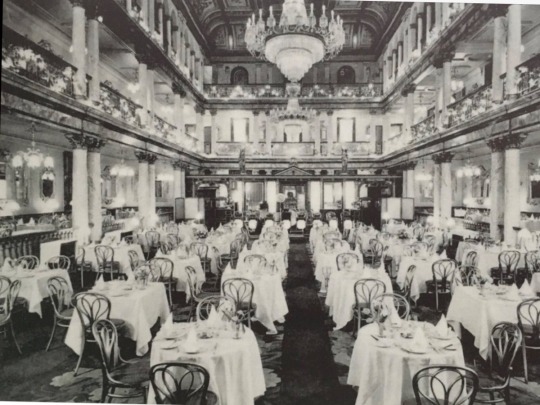
(The Criterion and the Holborn)
Now to other places he and Holmes frequented later. Here are some excerpts from London and the Culture of Homosexuality 1885-1914 by Matt Cook:
The West End was an obvious area for sensual experimentation and adventure.
- Because of their luxury and cosmopolitanism the new hotels [like the Savoy and the Ritz] were considered anti-domestic and even inappropriate for families;
- Trains and grand new stations allowed for chance meetings and anonymous sex, and the buses and trams presented similar opportunities;
- The opportunities provided by the crowded streets, toilets, parks, stations and trams could be taken up casually by men not initiated into a subculture. Despite Casement’s prolific sexual adventuring in the area, for example, he seems to have been entirely unaware of the associations of particular pubs, hotels, and theatres... Wilde was famously associated with Café Royale, at the south end of Regent Street... The Albermarle and Savoy Hotels were both named in the Wilde trials;
- This association developed further with the expansion of theatre-land;
- Sport clubs and swimming pools were other possible forums;
- The British Museum, and especially the statue galleries, [became] an important site in the city for many men. It was a place where it was legitimate to look at sculptures of naked men;
- The clubs and bachelor chambers in Pall Mall and St James’ formed a continuation of homosocial worlds of public school and university;
- Bachelors living in city centre flats featured frequently in court cases involving homosexual activity;
- The single bohemian and dandy similarly attracted suspicion, especially after the Wilde trials. The adjective “bohemian” cropped up repeatedly during his trials.
According to the book, numerous urban public places provided opportunities for queer men to seek each other out because such places attracted a great number of people. Genius, isn’t it? On the one hand, everything in Holmes and Watson’s lifestyle cries out “queer”, but on the other, they could visit all those places for purely innocuous reasons.
It should be also noted that all descriptions of Holmes as a “bohemian” predate 1895. Neither he nor Watson is described so after The Final Problem (1893).
Still, it doesn’t really matter whether queer-coding in the canon was intentional or not. I tend to agree with an opinion that ACD drew Holmes’ traits from the men he admired, some of whom were queer. So queer-coding is there, and that’s a fact.
97 notes
·
View notes
Text
THE EMPTY BOX
The Sign of the Four is an intricate house of mirrors, in which the reader is invited to enter and to which, in a very veiled manner, a way out has been indicated.
It’s not a coincidence that one of the first things we are told is that "Some facts should be suppressed". This immediately after the opening that deals with the bad habit of Holmes, an opening that is a perfect counterpart of the closure. The story opens and closes with Holmes dedicated to drugs, and in the middle we are explained why, suppressing the real reasons, or rather hiding them behind others, reflecting them in a mirror, telling their exact opposite.
If you notice carefully, in the first part of the novel there is a continuous play between the OPPOSITES. A suggestion that what is happening could be the exact opposite. NEGATIVE vs POSITIVE. First of all we introduced Mary Morstan. I have often seen her description as proof that Watson was actually describing Holmes and I honestly never understood the point. Actually it would seem to describe its exact opposite: FEMALE, BLONDE, MINUTE, IMPERFECT INCARNATE, BEAUTIFUL BUT NOT REGULAR FEATURES, SWEET AND AMABILE EXPRESSION. Holmes we know well: MALE, DARK, TALL, PALE, only a few lines after his features are described as "his clear-cut, hawklike features" and without even a precise reason. Rarely if ever the expression of Holmes is called sweet and lovable. The only thing certain is that Watson is infatuated from the beginning of the woman, but he thinks he is not at her level, and this even before any treasure is named in history.
On the first evening of their adventure, the doctor admits, because of the great stress, that he has repeatedly been confused. It seems he had told how during the war he had shot a musket entered his tent with a tiger, and advised caution with castor oil and ease with strychnine (CONTRARY).
During the evening the three pass the bridge of Vauxall Bridge Road, crossing the river to reach a more neglected part of the city. Here they stop in front of a house, squalid like the neighborhood that houses it, and the door is opened by an exotic Indian servant (CONTRARY). The house itself is a surprise, squalid outside, inside it hides incredible treasures and is luxuriously furnished (CONTRARY).
After all these opposites, perhaps it would not be so crazy if we asked ourselves if, by chance, the unreliable narrator, is not trying to tell us that yes he fell in love with someone, yes he probably did it when he set his eyes on he, yes, the first time they were close to each other was in the moment of danger, but he is not Mary Morstan but her CONTRARY.
"Miss Morstan and I stood together. A wondrous subtle thing is love, for here were we two who had never seen each other before That Day, between-whom no word or even look of affection had ever passed, and yet now in an hour of trouble our hands instinctively sought for each other . I have come to you so far, but I have been able to do it for you” . So how many times have we seen Holmes and Watson doing exactly the same thing? holding hands in the dark, looking for comfort? is this therefore love ?.
At this point in history we come to know the two brothers Sholto and we enter another dimension, from the opposite to the mirror.
The two are brothers, to be precise twins. One of the things that tormented us in BBC Sherlock is the sentence "they are never twins", even if then the solution of the case "my husband is three people" actually turns out to be a case of twins, even three identical ... are they twins or are they never? Does it refer to something else? With this I don’t want to imply that Thaddeus Sholto and Bartholomew Sholto aren’t twins. At the textual level there isn’t doubt that they are, but on a metaphorical level? On a metaphorical level they aren’t twins because they are the same person. They are identical twins, the same coin with two faces.
Thaddeus Sholto a refined esthete, an arts lover, a pipe smoker, a hypochondriac who believes he has a heart condition ... he asks Watson to check his heart.
Bartholomew Sholto is a chemist, misanthrope, he is found killed in a closed room. He kept a treasure hidden, a treasure that he didn’t want to share with anyone, but his killer took his treasure away from him (I understand that the fandom has irremediably corrupted my mind, but I would dwell on the murder weapon: "It was long, sharp, and black, with a glazed look near the point”.)
I would say that it is quite evident that the SHOLTO dyad represents SHerlock Holmes or SH which is good at the same.
Both share the same treasure, the treasure of Agra, which represents homosexual love (it comes from the east). A brother wants to share it with Mary Morstan. Attention, as I said here the games change, we aren’t longer in the realm of the opposite, but in the house of mirrors.
To better understand the mirrors you have to take a step back in time and forward in history (this meta is a bloody mess, I believe that nobody will ever understand anything).
Before Mary, Thaddeus and Bartholomeus there were their parents.
The CAPTAIN ARTHUR (really not too thin) MORSTAN, father of Mary who will marry CAPTAIN WATSON and MAJOR SHOLTO father of the twins that as we said can be seen as the perfect sum of Holmes. The two were inseparable.


Thaddeus Sholto / SH, a Bohemian esthete wants to share the treasure with Mary Morstan / Watson while Bartholomew Sholto, a grumpy chemist wants to keep it hidden. But a man with a wooden leg arrives to take it away anyway. Now ... a man with a wooden leg. I go back to the point where the fandom ruined me, once I was a good person, but considering the Victorian pruderie for the legs, which were even covered even those of the tables or called limbs because to say legs was indecente, here we have a man, Major Sholto, literally terrorized by another man with a wooden leg, and every bloody time I can’t help, but I think of an embarrassing and persistent erection.
Anyway, I said, Bartholomew was robbed by a man with a massive erection and was killed by the long, dark, shiny, wet spine (not my words, thank you) of whom? Of a wild of Antipodes. A native of the Andaman Islands at north of Sumatra (a case? Possible?). A cannibal. One who regulalry banquets with his similars. Now it’s obvious that put it in this way is repulsive, but Tonga represents the wild, unmentionable and inconceivable side of the events linked to the treasure of Agra. The erotic and unspeakable side in an era in which even the conjugal kisses were unspeakable. The wild and primordial side that dwells in any English gentleman (or not). In this case he prefers to feast with his fellows. (is that why in TFP Moriarty refers to cannibals in the TFP? in addition to the more obvious, too obvious, reference to SAW? And the fact of making him whistle is a mockery to Fleming, considered the tone definitely "bond" of the episode? Ian Fleming had made tell to someone of his Bond that you can recognize a homosexual, because he didn't know how to whistle ... but here I went off topic...).
The same Jonathan Small (the man with the massive erection) will turn out to be a fairly accurate mirror of Watson. MILITARY, INJURED to a leg, after having been involved with the theft of the treasure and sentenced to life imprisonment, he will start working in an infirmary and learning notions of MEDICINE. In the course of history it is suggested that during his stay in India he learned a certain familiarity with the men that it was not allowed at home: "Mr. Abelwhite was a kind man, and he would often drop into my little shanty and smoke with me, for white folk out there feel their hearts warm to each other.”
And so, it’s Small / Watson that forces SHolto to separate from his treasure after having him (his uncontrollable and wild part) stabbed (with his meat dagger) ... ok, I'll stop.
But things at the end of the 1800s were not very simple, they are not yet for someone now. We have Mary Morstan not particularly anxious for the treasure to be recovered, Watson who is terrified of it, Holmes quivering for a solution, but in the meantime also strives to be at his best like never before. He plays serenades to sleep Watson and lays dinners in which he plays the part of the friendly and jovial guest. A few other times, if we never, we see behavior more like a courtship.
And then there is the pursuit on the river. Holmes and Watson chase Small, Tonga and the treasure who are on board a small and fast boat, the Aurora
I would stop for a moment on the name because it's worth it. Aurora was the name of the Latin goddess of dawn, she is who brings a new day every morning from the east. She is the mother of the four winds, one of whom has a curious name ... Eurus ...
This is a frenetic pursuit, narrated with a growing climax. Watson himself admits that he has never experienced such excitement, "I have coursed many creatures in my countries during my checkered career, but never did sport give me such a wild thrill as this mad, flying man-hunt down the Thames" , while the engines are “panting”, and in the end the guns of the two men simultaneously shoot "Our pistols rang out together", while Tonga disappears in " the white swirl". After that the Aurora gets stuck, Small tries to escape, but his wooden leg gets entangled in the soft ground.
"See here," said Holmes, pointing to the wooden hatchway. "We were hardly quick enough with our pistols." There, sure enough, just behind where we had been standing, stuck one of those murderous darts which we knew so well. It must have been whizzed between us at the instant that we fired. Holmes smiled at it and shrugged His shoulders in his easy fashion, but I confess That it turned me sick to think of the horrible LITTLE death Which had passed so close to us That Night.”
Now if all this is not a climax and an exhausted post orgasm also cloaked by a certain sadness I don’t know ... (certainly could also be a pursuit along the river).
After the capture of Small Watson is left again at the bridge of Vauxall Bridge Road, which had already crossed earlier to reach the house of Thaddeus Sholto. It seems that the river is a watershed for our two men, and interesting things happen in the middle. “SHERLOCK (voiceover): When does the path we walk on lock around our feet? When does the road become a river with only one destination? Death waits for us all in Samarra. But can Samarra be avoided?” (x)

The doctor brings the treasure to Mary / Watson who does not seem at all anxious or happy to receive a treasure (intended to be then shared with the eccentric Sholto).
To our romantic eyes the story Holme /Watson is the most beautiful that has ever been written but we must never forget that at that time it was a love that could not be told. We can therefore forgive the recalcitrance to Watson. We can understand the why of Mary. Keeping in mind that some things in history are told to us otherwise. That some facts have been suppressed. That the treasure was thrown into the river, was buried by layers of mud, and there is only one beautiful empty box left. But this doesn’t mean that the treasure is gone, it is only hidden. A full declaration of subtext. The jewels are there, they are scattered around all the stories of the Canon, the reader careful is able to find them but have been dragged around by words like the river water. For all the others the Canon remains a beautiful box of fine Indian manufacture. Wonderful to see, even if it is empty inside.
This novel is a labyrinth in which to get lost, and I found, perhaps, the exit only of some corridors. I don’t know if I managed to make me even vaguely understand, thanks for coming up here, you are heroes (or masochists).
@ebaeschnbliah @gosherlocked @sagestreet @sarahthecoat @possiblyimbiassed @tjlcisthenewsexy @sherlockshadow @devoursjohnlock @tendergingergirl @221bloodnun
56 notes
·
View notes
Text
Ramble about Moriarty
The main reason I’m interested in the character is because we hardly know anything about him as a person from Canon. Sure, there is info, but it’s all second-hand (third-hand, if you include unreliable narrator Watson). And this is it:
Had an estimated total of 20 bank accounts, for money laundering (VALL)
Art collector, or at least had knowledge of famous painters, and Holmes claimed he did not steal La Jeune Fille a l’Agneau, but bought it (VALL)
Skilled teacher, and could come across as avuncular (VALL)
Paid his chief of staff 6,000 pounds a year, which was supposed to be more than the Prime Minister got (VALL)
Wrote a well-received treatise on the binomial theorem at 21 (FINA)
Wrote a book that, supposedly, no one dared review because it was too deep (FINA)
Stepped down as chair of mathematics at an unnamed university because of unspecified rumours (FINA)
Had that snake-like head-twitching tic (FINA)
Thought duelling/wrestling/baritsu-ing/whatever-ing Holmes above a waterfall was an appropriate way to get rid of him (FINA)
Had a brother, a colonel, also named James Moriarty (EMPT)
Had a younger brother who was a station-master (VALL)
Unmarried (VALL)
That still filled 12 bullet points, and there's probably more I didn’t sift out of the text, but it’s not enough for me! There’s potential for a story behind each of those things.
Holmes was described in excruciating but contradictory detail. Watson was described in mostly contradictory detail. I want the same for Moriarty. (If Doyle had written more stories with him in them, would he eventually have said he had a wife who called him ‘John’?)
And I think of him as a maths-themed Adam ‘The Napoleon of Crime’ Worth about as much as I think of Holmes as a bohemian Joseph Bell: useful from a Doylean view, but far from the solution to my curiosity.
It's not that I want him to be entirely sympathetic. I'm not against the ideas that he's misunderstood, pursued personal goals other than crime for fun and/or profit, or was shoved into the role by someone else, though those wouldn't be my first preferences. I don't mind thinking of him as gleefully immoral, either. I just want to understand why he became/continued to be himself.
I recently read this quote from the author Jeffrey Deaver:
I think every Sherlock Holmes needs a Professor Moriarty, James Bond needs his Blofeld - it’s the brilliance of the antagonists that bring out the brilliance of the heroes.
Ok, two things:
Moriarty was created relatively late, to further Holmes’ character only in the direction of death, so it’s lucky that he was convincing in his role, for someone who popped out of nowhere. Though, arguably, any character would have gotten a villainous status boost if they had been the one to kill Holmes.
But popping out of nowhere also increased his credibility. The best criminals don’t get caught. So he does come across as brilliant in Canon - but like an unidentified object shining from thousands of miles away. What is it? Somebody whip out a telescope.
And because I am neither satisfied with what’s in Canon, nor do I have any serious headcanons about Moriarty, I am on a slow, slow quest to appraise various Moriarties.
But I don’t have any Strong Opinions about who Moriarty should be, so I just go “mm, plausible... plausible... I see you’re having a good time, congratulations... doesn’t fit with Canon, but it’s fun... not to my taste, but whatever floats your boat... I don’t like it, so I won’t read... etc.”
So what this means is, I will never pin down Moriarty.
I see why Holmes needed to stalk him.
183 notes
·
View notes
Text
IXD304
Researching Sherlock Holmes
Sherlock Holmes is a fictional private detective created by the British author Sir Arthur Conan Doyle. Referring to himself as a "consulting detective" in the stories, Holmes is known for his high observation skills, experience in forensic science, as well as his logical reasoning that borders on the crazy to most who don’t know him well. He investigates cases for a wide variety of clients, including Scotland Yard.
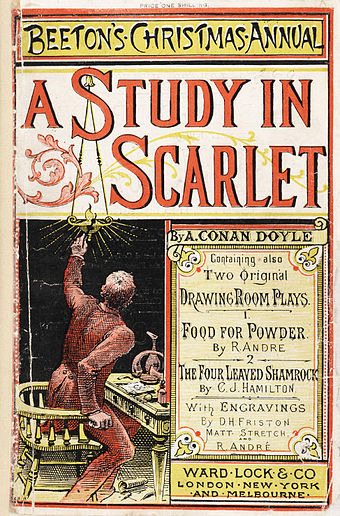
First appearing in print in 1887's A Study in Scarlet, Sherlock’s popularity became widespread with the first series of short stories in The Strand Magazine, beginning with "A Scandal in Bohemia" in 1891. This series eventually totalled to four novels and 56 short stories. All but one are set in the Victorian or Edwardian eras, between about 1880 and 1914. Most are narrated by the character of Holmes's friend and biographer Dr. John H. Watson, who usually accompanies Holmes during his investigations and often shares quarters with him at the address of 221B Baker Street, London, where many of the stories begin.
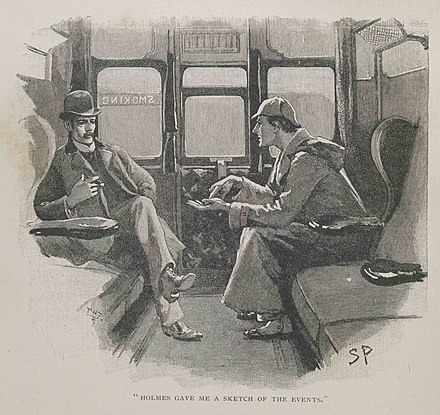
Although Sherlock isn’t the first fictional detective in stories, Holmes is arguably the best known. By the 1990s, there were already over 25,000 stage adaptations, films, television productions and publications featuring the detective, and the Guinness World Records even lists him as the most portrayed literary human character in all of film and television history.
Holmes's popularity hit an all time high to the fact that many belief him to be a real person and not just a fictional character in story books. Fans of the franchise helped create the modern practice of fandom. The character and stories have had a profound and lasting effect on mystery writing and popular culture as a whole, with the original tales as well as thousands written by authors other than Conan Doyle being adapted into stage and radio plays, television, films, video games, and other media for over one hundred years.
The inspiration behind Sherlock Holmes stemmed from Edgar Allan Poe's C. Auguste Dupin which is generally acknowledged as the first detective in fiction. Similarly, the stories of Émile Gaboriau's Monsieur Lecoq were extremely popular at the time Conan Doyle began writing Holmes, and Holmes's speech and behaviour sometimes follow that of Lecoq. Holmes and Watson discuss Dupin and Lecoq near the beginning of A Study in Scarlet.
Conan Doyle repeatedly said that Holmes was inspired by the real-life figure of Joseph Bell, a surgeon at the Royal Infirmary of Edinburgh, whom Conan Doyle met in 1877 and had worked for as a clerk. Like Holmes, Bell was noted for drawing broad conclusions from minute observations. However, he later wrote to Conan Doyle: "You are yourself Sherlock Holmes and well you know it". Sir Henry Littlejohn, Chair of Medical Jurisprudence at the University of Edinburgh Medical School, is also cited as an inspiration for Holmes. Littlejohn, who was also Police Surgeon and Medical Officer of Health in Edinburgh, provided Conan Doyle with a link between medical investigation and the detection of crime.
Watson describes Holmes as "bohemian" in his habits and lifestyle. Described to have a "cat-like" love of personal cleanliness, Holmes is an eccentric with no regard for standard tidiness.
Watson describes him as
“in his personal habits one of the must untidy men that ever drove a fellow-lodger to distraction. [He] keeps his cigars in the coal-scuttle, his tobacco in the toe end of a Persian slipper, and his unanswered correspondence transfixed by a jack-knife into the very centre of his wooden mantelpiece. ... He had a horror of destroying documents.... Thus month after month his papers accumulated, until every corner of the room was stacked with bundles of manuscript which were on no account to be burned, and which could not be put away save by their owner.”
While Holmes can be dispassionate and cold, when pulled into an investigation, he is animated and excitable. He has a flair for showmanship, often keeping his methods and evidence hidden until the last possible moment so as to impress observers.
Except for that of Watson, Holmes avoids casual company. In "The Gloria Scott", he tells the doctor that during two years at college he made only one friend: "I was never a very sociable fellow, Watson ... I never mixed much with the men of my year".
The detective goes without food at times of intense intellectual activity, believing that "the faculties become refined when you starve them."
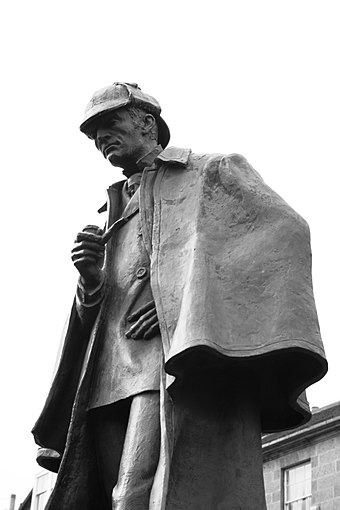
Although Holmes is not the original fictional detective, his name has become synonymous with the role. Doyle's Sherlock Holmes stories introduced multiple literary devices that have become major conventions in detective fiction, such as the companion character who is not as clever as the detective and has solutions explained to him (thus informing the reader as well), as with Dr. Watson in the Holmes stories. Other conventions introduced by Doyle include the arch-criminal who is too clever for the official police to defeat, like Holmes's adversary Professor Moriarty, and the use of forensic science to solve cases.
The Sherlock Holmes stories established crime fiction as a respectable genre popular with readers of all backgrounds, and Doyle's success inspired many contemporary detective stories. Holmes influenced the creation of other "eccentric gentleman detective" characters, like Agatha Christie's fictional detective Hercule Poirot, introduced in 1920.
The phrase "Elementary, my dear Watson" has become one of the most quoted and iconic aspects of the character. However, although Holmes often observes that his conclusions are "elementary", and occasionally calls Watson "my dear Watson", the phrase "Elementary, my dear Watson" is never uttered in any of the sixty stories by Conan Doyle. One of the nearest approximations of the phrase appears in "The Adventure of the Crooked Man" when Holmes explains a deduction: "'Excellent!' I cried. 'Elementary,' said he."
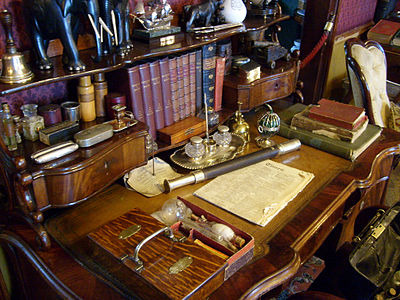
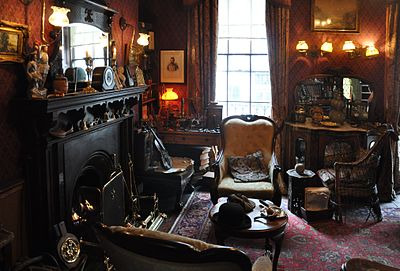
For the 1951 Festival of Britain, Holmes's living room was reconstructed as part of a Sherlock Holmes exhibition, with a collection of original material. After the festival, items were transferred to The Sherlock Holmes (a London pub) and the Conan Doyle collection housed in Lucens, Switzerland by the author's son, Adrian. Both exhibitions, each with a Baker Street sitting-room reconstruction, are open to the public.
In 1969, the Toronto Reference Library began a collection of materials related to Conan Doyle. Stored today in Room 221B, this vast collection is accessible to the public. Similarly, in 1974 the University of Minnesota founded a collection that is now "the world’s largest gathering of material related to Sherlock Holmes and his creator". Access is closed to the general public, but is occasionally open to tours.
In 1990, the Sherlock Holmes Museum opened on Baker Street in London. A private Conan Doyle collection is a permanent exhibit at the Portsmouth City Museum, where the author lived and worked as a physician.
Sources:
https://en.wikipedia.org/wiki/Sherlock_Holmes
0 notes
Text
What Uncle Rudy Began: Thoughts on Naked is the Best Disguise II
I recently wrote a thing about Samuel Rosenberg’s book Naked is the Best Disguise: The Death and Resurrection of Sherlock Holmes (1974), promising to come back for a closer look at its influence on Sherlock.
Short version: The book has some very good ideas in it, although I don’t find it entirely reliable as a source about Doyle’s writings. However, because it’s an important piece of Sherlockian history, Sherlock can and does draw from it.
One of the things Sherlock appears to have drawn from it is Uncle Rudy.

“The siren call of old habits. How very like Uncle Rudy… though in many ways, cross-dressing would have been a wiser path for you.” (His Last Vow)
An important component of Rosenberg’s “Conan Doyle Syndrome” is the gender reversal of a character. In the simplest example, we expect a character to be a man, and that character turns out to be a woman (e.g., A Scandal in Bohemia), or vice versa (e.g., Shoscombe Old Place). These two examples involve cross-dressing, but it can be something more subtle (e.g., a man with womanly hands in The Red-Headed League). This event is associated with the confrontation between Holmes and the criminal he pursues, but the character who is literally or symbolically gender-swapped need not be the criminal.
Another important component of the syndrome is the reading of a written message, which can take any form: a book, letter, note, etc., that suggests some sort of sexual misconduct. Among other examples, Rosenberg points out that in A Study in Scarlet, while Holmes is off trailing a recent visitor to 221B (who turns out to be a man disguised as a woman), Watson spends a couple of hours reading a copy of Henri Murger’s 1851 story collection, Vie de Bohème (properly, Scènes de la Vie de Bohème). You might also find Murger’s work under “Henry” Murger, because he switched out the I for a Y early in his career.
These stories were originally published as a serial in the French magazine Le Corsaire (the appropriately gender-ambiguous French word for “pirate”) in 1845, and have been adapted many times over, perhaps most recognizably as Puccini’s opera La Bohème, the musical Rent, and Baz Luhrmann’s film Moulin Rouge.

La Vie de Bohème 1945 film poster
... petticoats, pirates, and parental ambivalence (of a sort) under the cut.
We find Watson reading Vie de Bohème (in the original French, evidently; as far as I can tell, the first translation to English was in 1888) very soon after he and Holmes moved into 221B together – and how appropriate, given that its stories are primarily about the relationship between Bohemian roommates Marcel and Rodolphe. As Doyle did with Watson, Murger based Rodolphe on himself. A Study in Scarlet was Doyle’s own Vie de Bohème, which is revealing, given the double meaning of “Bohemian”. The Bohemians believed in “art for art’s sake”, a phrase which was used by Murger in the preface to these stories, was often associated with Oscar Wilde, and was alluded to by Doyle multiple times. It is how Holmes describes himself:
"I play the game for the game's own sake," said [Holmes]. "But the problem certainly presents some points of interest, and I shall be very pleased to look into it. Some more facts, please." (The Bruce–Partington Plans)
“The attack upon Mr. Warren further shows that the enemy, whoever they are, are themselves not aware of the substitution of the female lodger for the male. It is very curious and complex, Watson."
"Why should you go further in it? What have you to gain from it?"
"What, indeed? It is art for art's sake, Watson.” (The Red Circle)
Rodolphe is a struggling writer (much as Murger and Doyle were); he is working on a play called Rache Vengeur, or “The Avenger”, which he has tried and failed to sell to the theatres of Paris. By chance, he happens to meet an uncle who makes him an offer: a large advance to write something serious, a manual on the construction of chimneys, instead of this silly play. Rodolphe happily takes the money, but doesn’t do the work.
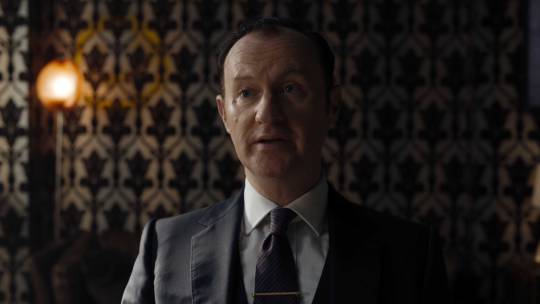
“Uncle Rudy took care of things.” (The Final Problem)
Angry, the uncle imprisons Rodolphe in his apartment, taking away his cigarettes and his clothes and leaving only a “Turkish disguise” for him to wear. Rosenberg, in his excitement to translate cross-dressing in La Vie de Bohème to cross-dressing in the Holmes tales, conflates two stories in Naked is the Best Disguise: he insists that Rodolphe was given women’s clothes to wear, including “petticoats”. The petticoat in this story actually belonged to Rodolphe’s friend Schaunard:
“To protect himself against the biting north-wind, Schaunard slipped on in haste a pink satin petticoat with spangled stars, which served him for dressing-gown. This gay garment had been left at the artist's lodging, one masked-ball night, by a folie, who was fool enough to let herself be entrapped by the deceitful promises of Schaunard...” (La Vie de Bohème)
Nonetheless, the costume Rodolphe’s uncle leaves him with is feminine enough to keep him indoors.
“The following morning, by means of a masculine disguise, which Sidonia procured for him, Rodolphe was enabled to escape from his uncle's lodging.” (La Vie de Bohème)
The English equivalent of the name Rodolphe is Rudolph, which shortens to Rudy. Regardless of the provenance of the petticoats, it seems likely to me that Sherlock’s Uncle Rudy is a direct reference to Vie de Bohème ‘s Rodolphe.
So, I think the ties between Vie de Bohème and A Study in Scarlet are deeper than Rosenberg realized, but his point is still entirely valid: Watson reading this book foreshadows Holmes’ discovery that his suspect was cross-dressing, and also the consistent trend of gender reversal that would continue throughout the Sherlock Holmes stories (and many of the apocryphal Holmes stories).

“What Uncle Rudy began, I thought it best to continue.” (The Final Problem)
But look what else Sherlock has done with this Vie de Bohème reference: it’s not just a gender reversal, it’s a generation reversal. They’ve turned powerless nephew Rodolphe into his own powerful uncle. Why?
I don’t think this is just about Mofftiss being coy about their source for Uncle Rudy. I think this an example of something they’ve been doing systematically throughout the series. So systematically that Moffat dropped a reference to it in the Doctor Who episode Knock, Knock (an intertext for The Lying Detective).

“He isn’t your father... Eliza, he’s your son.” (Doctor Who: Knock, Knock)
Why do they want us to notice the confusion between generations among these characters? I think mainly because Sherlock is all about the life of one man, Arthur Conan Doyle, who had trouble distinguishing the roles of a woman in his own life: his mother, Mary Josephine Elizabeth Doyle.
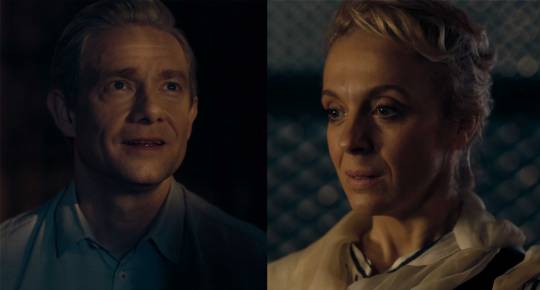
"I always liked Mary."
"Yeah, me too. I used to." (The Six Thatchers)
We’ve talked a fair bit about how Doyle wrote a Sherlock Holmes character and a John Watson character into many of his stories, under different names. The most blatant of these stories, The Stark Munro Letters, is ubiquitously referred to as an “autobiographical novel”, in which J. Stark Munro is a thinly veiled A. Conan Doyle and James Cullingworth is a thinly veiled George Budd. @sherlock-overflow-error wrote a terrific meta about this already (really, go read that if you haven’t), but the highlights relevant here are:
-- Doyle, Munro, and Watson are the same person.
-- Budd, Cullingworth, and Holmes are the same person.
-- In The Stark Munro Letters, Munro’s mother interferes in Munro and Cullingworth’s friendship; she writes letters encouraging Munro to drop Cullingworth. When Cullingworth discovers these letters, he abandons Munro.
If this novel really is autobiographical, then Mary Doyle came between Doyle and Budd, just as her namesake, Mary Morstan, would come between Watson and Holmes. Whether or not he did it consciously, Doyle wrote his own mother into the Sherlock Holmes stories, as John Watson’s wife.
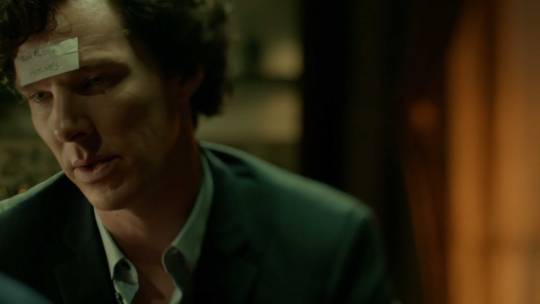
“Beauty is a construct built entirely on childhood impressions, influences, and role models.” (The Sign of Three)
Yeah, John knows that, Sherlock. He really knows.
Doyle also gave Mary a Mor- surname, the hallmark of a villain in the Sherlock Holmes stories. But his feelings were conflicted: just as Sherlock’s John Watson did, Arthur Conan Doyle named his own first child Mary. Perhaps more significantly, in The Sign of the Four, he also named Mary Morstan’s absent father... Arthur. Mary was his mother, his wife, and his child, all at once. Both his writing and his life appear to have been utterly consumed by her.
I think that the publication of The Parasite, during the period between the death and resurrection of Sherlock Holmes, may have been an acknowledgement of this. And I think that the takeover of Sherlock by Mary in S3–S4, is essentially a meta-textual reference to all of Doyle’s mother issues.
I don’t want to go into this at length, partly because I don’t feel I’ve read enough about Doyle to do so (will a lifetime be enough?), and partly because I’d like to write a longer piece on this later, but I thought this would be a good way to introduce these generational parallels, which it appears we are intended to see in Sherlock, given how often they recur.
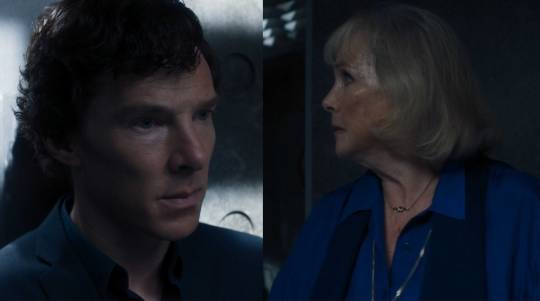
“Sherlock? Well? You were always the grown up. What do we do now?” (The Final Problem)
Good question.
Other parts of this series:
Part I: Thoughts on Naked is the Best Disguise: An overview of Rosenberg’s good and bad ideas.
Part III: The Devoted Friend: Sherlock Holmes and Oscar Wilde – Death, Resurrection, and Sacrifice.
@may-shepard @darlingtonsubstitution @jenna221b @sherlock-overflow-error @green-violin-bow @marcespot @tjlcisthenewsexy @toxicsemicolon @holmesianscholar @monikakrasnorada @ebaeschnbliah @shamelessmash @sarahthecoat @gloriascott93 @mrskolesouniverse @swimmingfeelsinajohnlockianpool
#Sherlock#Samuel Rosenberg#Naked is the Best Disguise#ACD#cross-dressing#Uncle Rudy#A Study in Scarlet#Henri Murger#La Vie de Bohème#John Watson#Mary Morstan#The Sign of the Four#uncle-nephew#mother-wife-daughter#The Parasite#S4#DW#intertext#meta-text
142 notes
·
View notes
Text
Sign of Four and mirroring in ACD.
I never got around to writing up my sparse notes on last week’s chapters but today I found an audiobook version on youtube that conveniently has the entire book in one huge “video” so I don’t have to keep opening new chapters. I went ahead and listened from the beginning as I was sewing, so I heard again Watson’s description of Mary Morstan as she arrives in 221B. He talks about her as having a firm step, outward composure, dressed in perfect taste, but plainness and simplicity, her face isn’t “regular of feature”, ie, conventionally beautiful, but her amiable and sympathetic expression made her attractive to him, and indicated her refined and sensitive nature.
This immediately struck me as sounding very similar to how Watson has described Holmes, he has “ a quiet primness of dress” (I forget which story that’s from atm), his face has a lot of character, but his enthusiasm is infectious, he blushes when Watson praises him, his “hawk like features” show his concentration and attention. Clearly Watson also finds Holmes very attractive even if he isn’t conventionally handsome.
OK so how else are they alike? both are smart, she’s 27, same age as Holmes was when he and Watson met, her voice has “deep rich tones”, and she turns out to be an asset in an investigation, knowing what sort of evidence to hang onto. To Holmes she is “a unit, a factor, nothing more”, which begins to sound a lot like a mirror character, a stand-in for Holmes himself. Through the character of Mary Morstan, Watson can more safely express his rapid and strong attraction, his protective feelings, and also his insecurity about their unequal finances.
Then I started noticing all kinds of mirroring, in all the side characters! I’m still pretty new at this, but here is what stuck out to me:
Thaddeus Sholto=Holmes; bohemian lifestyle, smoking the hookah (dope?), bit of an oddball, but basically a good heart, generous, wants to do the right thing. He’s worried about his HEART though, and asks Watson to LISTEN to it... His fearful demeanor, worried that he’ll be mistaken for the murderer... maybe Holmes has some hidden fears? (and I couldn’t help remembering Sherlock’s line in ASIP about “by the way I’m not the murderer”)
Bartholomew Sholto=Holmes; chemist, attic with a hidden treasure, (=Holmes’ brain-attic full of knowledge) but dead/murdered (=in love/heartbroken) by a DART (=cupid’s arrow) in a locked room (=heart that was closed off)
Tonga=Watson, “able and efficient ally”, his dart killed B. Sholto, oops = Watson, oops, made Holmes fall in love with him. Tonga came in through the attic=Watson came into Holmes’ heart via his mind, the work.
Watson taking Mary home and coming back with Toby the dog= putting the romance aside and concentrating on the work/case. During this bit, Watson worries again about their disparate finances. He doesn’t think he’s an attractive prospect to someone with a substantially larger income than his own.
Mr. SHERman=Holmes again, another peculiar fellow who is good & helpful, and in particular, good with all sorts of animals. In fairy tales, the person all the animals want to help, is a Good Person. (see also, don’t date someone your dog doesn’t like)
Toby the dog=Watson. he’s a cross between a spaniel & a lurcher, like Watson is both a doctor and a soldier. His “peculiar waddling gait” suggests Watson’s intermittent limp. He starts out on the right trail, but is misled when it’s crossed by a stronger one... like Watson starts out zipped onto Holmes, but gets distracted by Mary, the socially conventional choice. But brought back to the point where he got mixed up, he does get back on the right track. :)
Jonathan Small=Watson, in a cautionary there-but-for-fortune way. he was also in the army, also got a leg injury and invalided out, and his second career also got ruined. But he fell in with murderers instead of a crime-solver. Still, Small proved loyal to his gang. And if murdering=making someone fall in love with you, then he’s maybe mirroring “three continents Watson” a little bit.
This last one is kind of “out there” cos it’s really a crossover mirror between ACD and BBC, but the way Watson writes Athelney Jones as a pompous a-hole, dismissing and belittling everyone, is just a bit like BBC Mycroft, in his patronizing, sneering mode when he’s belittling Sherlock’s intellect. So it gave me a little chuckle when it was SHERLOCK’s name that “literally opens doors” twice in this story, both at Pondicherry Lodge, when McMurdo won’t let Thaddeus Sholto vouch for his friends, but he will let Holmes do so, and at Mr Sherman’s when Watson goes to collect Toby the dog.
#acd sign#sign acd#astudyincanon#astudyincanonbookclub#mirroring in acd#mirroring in sherlock#mary morstan=sherlock holmes#thaddeus sholto=sherlock holmes#bartholomew sholto=sherlock holmes#mr sherman=sherlock holmes#tonga=watson#jonathan small=watson#toby the dog=watson
46 notes
·
View notes
Text
Sink or Ship? - Canon Holmes

With 120+ years of history and countless interpretations, it becomes nigh impossible to make blanket statements about the world’s most famous detective. If I say “Holmes and Watson were totally a couple,” well, great, but which Holmes and Watson am I talking about? Each is so wildly different that it’s entirely possible for a person to interpret one version a certain way and another version another way. Holmes is no longer one character—he is many characters filtered through the actions and preferences of hundreds of actors and directors, providing us with an infinite variety to choose from.
And so today I’ll be starting a new series, Sink or Ship, to look at different versions of everyone’s favorite detective (sorry, Batman) and his ever-faithful biographer, and explain whether or not I personally ship them and why.
Let’s start at the beginning, shall we? Gather ‘round now, kids, Auntie Eileen is gonna give you a gay old Victorian history lesson.
(For an earlier version of this history lesson, please see the post I wrote for C.M. Spivey’s blog series, A+ Ships.)
There’s no definitive proof that Holmes and Watson were in a romantic relationship, of course, and many of the signals that would be interpreted as evidence of such could really just be a product of the time period. For example, Holmes and Watson hold hands rather a lot (see: The Speckled Band, Charles Augustus Milverton), but that’s because Victorian men didn’t have the concept of ‘no homo’ hanging over them. Male friends frequently hugged, held hands, and took what we would consider to be mushy pictures together.
But it’s like I said. There’s no definitive proof they were a couple… and there’s no definitive proof they weren’t. In A Study in Scarlet, Watson says he’s staying at “a private hotel in the Strand.” Hotels in this area were frequently used as hook-up places for homosexuals. Most famously, Oscar Wilde was fond of the Savoy. Other popular meet-up spots were West End parks, where soldiers and former soldiers (as Watson was a former soldier), who weren’t paid very well, were known to solicit upper-class gentlemen. The problem got so bad that, in 1903, a law was passed forbidding soldiers from loitering in parks in uniform after dark, and the image of a soldier—particularly a guardsman—became closely linked with homosexuality.
TL;DR Watson was either a sex worker or he got mistaken for one at least once.
Then there’s Holmes himself, who is described as a clean-shaven ‘bohemian’ (as Watson describes him in, appropriately, A Scandal in Bohemia) bachelor living in the West End, which fits perfectly into another contemporary stereotype (epitomized by the unfortunate Mr. Wilde) about men who had sex with men. Later in the century, ‘bohemian’ basically became a euphemism for ‘sodomite’ during the Wilde trials. (FWIW Watson also describes himself as having a ‘Bohemianism of disposition’ in The Musgrave Ritual). Furthermore, men with no facial hair, like Holmes, were regarded as leaning (if not more) towards effeminacy.
And then of course there is Holmes’ legendary hatred for blackmailers, as shown in the short story Charles Augustus Milverton. I think most people, Victorian or otherwise, don’t like blackmailers all that much, but they were the particular bane of Victorian homosexuals. Some blackmailers devoted themselves entirely to entrapping gay men (some even based their operations at those West End hotels I mentioned) and then demanding money. Victorian men who dared act on their attraction to other men were all too aware that the tiniest indiscretion on their part could end in devastating jail sentences and total disgrace. More than one accused homosexual committed suicide rather than risk a trial.
Lastly, there is Watson’s marriage. Or marriages. And therein lies the problem. Not only does Mary Morstan completely disappear after her part in The Sign of the Four—being occasionally referred to only as ‘my wife’ as Watson runs out the door to hang with Holmes—she is later killed off in an unspecified manner. Okay, fine, that last part’s understandable. Maybe Watson just didn’t want to talk about his wife’s death. But Doyle seems to have screwed up the timeline of Watson’s marriage, describing him as married well after Mary supposedly died. This means that Watson either married more than once, or Watson himself couldn’t keep track of dates what with all the other fact-fudging he admits to doing to protect the innocent. OR maybe he never married at all and his wedding was just a cover for something else.
But again, this is all circumstantial. Not everyone who visited a hotel in the West End in Victorian England was gay, not every London bachelor without a beard shared Wilde’s proclivities, and seeing an author who was at best ambivalent about his characters mess up continuity doesn’t mean there’s a big gay conspiracy going on. And if you don’t feel like shipping them, that is a perfectly legitimate and cool way to read the text. But if you DO feel like shipping them, there is a surprising amount of historical evidence to back you up.
SINK OR SHIP?: Man, there’s enough ship here for a dang fleet.
Sources
How to Be a Victorian - Ruth Goodman
London and the Culture of Homosexuality, 1885-1914 - Matt Cook
263 notes
·
View notes
Text
Henry Higgins is Eliza’s gay adoptive dad
This is a series of meta exploring my new perspective on the relationships in My Fair Lady. Though many people, previously including me, interpret it as a love story between Eliza and Henry Higgins, the film actually seems to encourage another reading entirely – Henry Higgins and Colonel Pickering are Eliza’s adoptive parents. I’ll go into how I think this queer reading of My Fair Lady is supported by the text and subtext, and how it actually allows Eliza and her gay dads the happy ending they all deserve.
Part 3: Henry Higgins is as straight as Sherlock Holmes
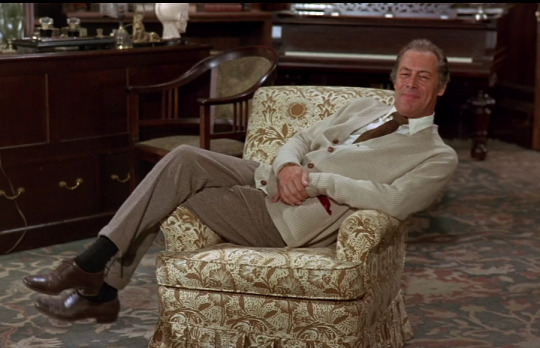
In Part 2, I discussed how Higgins and Pickering’s first meeting qualified as a meet cute. Incidentally, it was upon studying this meet cute that I noticed something (before reading several articles on the subject) as a queer Sherlock Holmes fan: Higgins and Pickering seemed very familiar. Let me summarize their meeting again for perspective:
A veteran who just came back from a stay abroad meets an eccentric who is a genius in a very esoteric field. The eccentric DEDUCES where people are from based on tiny nuances in their speech patterns that no one else would notice (and is mistaken for a detective, HA). The veteran likes this man instantly despite his eccentric behavior, and immediately moves in with him. He’s an eager student in all of the eccentric’s ways, is very quick to praise, and enables a lot of the eccentric’s worst behavior, never giving more resistance than a “Be reasonable!”
The similarities are suspicious, but what really clinched it for me was this description of Higgins from the screenplay:
When the lights go on, as they will in a moment, HIGGINS in the morning light is seen to be a robust, vital, appetizing sort of man of forty or thereabouts. He is of the energetic scientific type, heartily, even violently, interested in everything that can be studied as a scientific subject, and careless about himself and other people, including their feelings. He is, in fact, but for his years and size, rather like a very imperious baby “taking notice” eagerly and loudly, and requiring almost as much watching to keep him out of unintended mischief. His manner varies from genial bullying when he is in a good humor to stormy petulance when anything goes wrong; but he is so entirely frank and void of malice that he remains likable even in his least reasonable moments.
Henry Higgins is Sherlock Holmes, and that makes Pickering his Watson – and that immediately leads to questions about just how straight Higgins could possibly be.

To start, both Holmes and Higgins have their potential feelings concerning women addressed and dismissed. Watson will frequently say (and most notably in “A Study in Scarlet,” concerning Irene Adler) that Holmes has never shown love for a woman, because it goes against his logical nature. For Higgins, aside from an entire song about all the qualities he supposedly sees and completely despises in women, there’s another lovely tidbit from the screenplay:
(…But as to HIGGINS, the only distinction he makes between men and women is that when he is neither bullying nor exclaiming to the heavens against some featherweight cross, he coaxes women as a child coaxes its nurse when it wants to get anything out of her)
At this point, assuming Higgins sees Eliza romantically because she commands his respect is akin to assuming Holmes sees Irene Adler romantically because she outsmarts him. No, really; the idea is dismissed in both texts, and yet the assumption has prevailed for practically as long as the texts have existed – neither Holmes nor Higgins can escape it.
I know authorial intent is to be taken with a grain of salt, but here’s an interesting little bit of history: George Bernard Shaw, the author of Pygmalion (from which My Fair Lady is of course based), was outraged when the first stage production put Higgins in a more romantic light. He actively fought for productions to dispel any notion of romance between Higgins and Eliza from 1914 to at least 1938, when the film was made – that’s almost 25 years of saying no and still not being listened to – and that’s before My Fair Lady was even conceived.
But, even when paying the author no mind, each text does a perfectly good job of demonstrating that their male heroes are very much not straight. At this point, the argument becomes a bit more nuanced, because it’s very possible that Higgins is, like many read Holmes to be, asexual. That reading is completely supported by the text. I’d also say, however, that there is some subtext in My Fair Lady that lends itself to read Higgins and Pickering as being a couple, and much of it is for the same reason we read Holmes and Watson as being together.
One of the little tidbits you learn from queer study of Sherlock Holmes is that the word “bachelor” is thrown about quite a bit in the Holmes stories, and the term has been used in popular culture as a euphemism for a man being homosexual. “Confirmed bachelor” is even stronger, because it insinuates he’ll never marry.
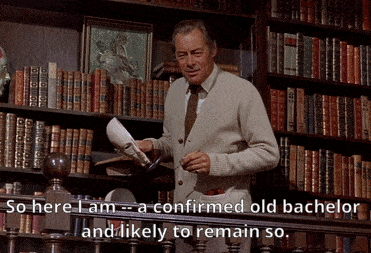

Additionally, Holmes is often described as bohemian, and a lot of the gestures and movements he makes can be interpreted as flamboyant and are often portrayed that way – the most prominent of which being his expressive, “nervous” hands.
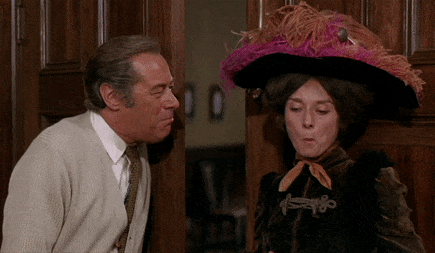
On top of that, though Holmes sometimes seems a bit at odds with social mores involving contact with other people, it’s always clear that he is incredibly physically comfortable with Watson, touching his shoulder or looping through his arm. He in fact seems more comfortable touching Watson than just about anyone else.

(Okay, the similarities are almost getting silly now.)
Honestly, of the few ways Holmes and Higgins do differ, the most glaring of which to me is that, while Holmes is often uninterested in talking about his feelings, Higgins likes to wax poetic about his, especially when he’s completely contradicting himself. It’s actually a good thing, though, because instead of small glimpses into how his mind works, Higgins bares all like he’s kicking through a pair of double doors.
He rants about all of the reasons he dislikes women in the beginning of the film, which is bad enough, but it gets even worse – or should I say better? – at the end, when he sings what I affectionately call his “I like men” song. It starts out with the line: “Pickering, why can’t a woman be like a man?”
HIGGINS. Yes … why can’t a woman be more like a man?
Men are so honest, so thoroughly square;
Eternally noble, historically fair…
This goes on for a bit. Not only is this song absolutely hilarious characterization and one of the best bits of verbal irony I’ve ever seen (though the irony is lost on Higgins because he believes every word of it), it’s also… not very straight. This song is basically one big flashing neon sign saying “I like men,” and Henry Higgins is twirling it like a baton. But wait; it gets so much better:
Why can’t a woman take after a man?
Men are so pleasant, so easy to please;
Whenever you are with them, you’re always at ease.
Would you be slighted if I didn’t speak for hours?
PICKERING. Of course not!
HIGGINS. Would you be livid if I had a drink or two?
PICKERING. Nonsense.
HIGGINS. Would you be wounded if I never sent you flowers?
PICKERING. Never.
HIGGINS. Well, why can’t a woman be like you?
At this point in the song he elegantly drapes himself down next to Pickering on the couch, and “addresses” the few, small issues some men may possess, discussing how they are most definitely the exception to the rule. Pickering is so amused.
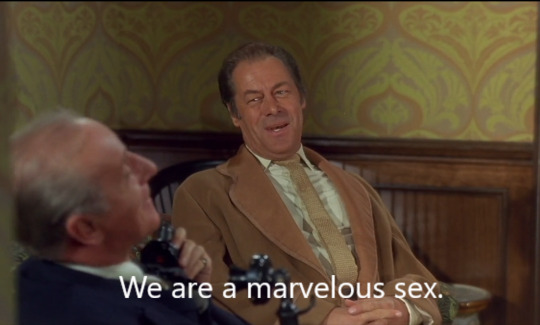
And then Higgins goes on:
Why can’t a woman take after a man?
Because men are so friendly, good-natured and kind.
A better companion you never will find.
If I were hours late for dinner, would you bellow?
PICKERING. Of course not!
HIGGINS. If I forgot your silly birthday, would you fuss?
PICKERING. Nonsense.
HIGGINS: Would you complain if I took out another fellow?
PICKERING. Never.
HIGGINS. Well, why can’t a woman be like us?
And there you have it. Not much to say after a song like that. When you view this film through a heteronormative lens, you tell yourself that this is Higgins listing all of men’s apparently amazing qualities just because he thinks he has all of these qualities – narcissistic projection at its worst. And, though I still think there’s an element of that, if you allow a queer reading of the song, it’s all there, ripe for the picking. Honestly, is it even subtext at that point?
So, in conclusion, Henry Higgins is an archetype, and a very famous one at that – and if he’s based on Sherlock Holmes, there is a very strong possibility that he is not very straight.
Previous
@oddcomoddity @tremendousdetectivetheorist (If anyone else wants to be tagged for the rest of the series, let me know in the comments!)
#higgins is eliza's gay dad#henry higgins#sherlock holmes#my fair lady#meta#rex harrison#colonel pickering#queer reading
65 notes
·
View notes
Text
~Doctor Watson, P.II~
Doctor Watson : Prolegomena to the study of biographical problem, with a bibliography of Sherlock Holmes is a study written by S. C. Roberts first published in 1931 by Faber & Faber Ltd. (Criterion Miscellany No. 28).
Whatever may have been the exact date of Watson's marriage with Miss Morstan [27], it would seem clear that in the early years, at least, of his married life Watson achieved the happiness which he desired and deserved. Such glimpses as he gives us of his hearth and home suggest a picture of domestic Bohemianism which was in complete harmony with Watson's temperament. So long as he had believed that Miss Morstan might be a rich heiress, his delicate sense of honour had prevented him from declaring his passion. But when it was finally known that the Agra treasure was lost and that the 'golden barrier' (to use Watson's own picturesque phrase) was removed, Watson could rejoice in the prospect of sharing the simple home of a middle-aged practitioner with one whom even Holmes described as one of the most charming young ladies he had ever met. Holmes, indeed, went further: he regarded the marriage of Miss Morstan as a loss to the detective profession. 'She had a decided genius that way,' he admitted to Watson — high praise, indeed, from Holmes, exceeded only by his admiration for Irene Adler, who 'eclipsed and predominated' the whole of her sex in the detective's eyes.
But to return to Watson's marriage. Of the ceremony itself we have no specific record. We may, however, assume that it was not marred by any vulgar ostentation. If Miss Morstan on her first visit to Baker Street gave the impression of a small and dainty blonde, 'well gloved and dressed in the most perfect taste', we may safely conjecture that the 'plainness and simplicity' which Watson then noted in her costume were also the predominant characteristics of her bridal appearance. Whether Holmes was induced to be best man is at least doubtful, since Watson would hardly be likely to omit a record of so personal a tribute; with the exception of one aunt, neither Watson nor his bride had relatives living; consequently it seems most probable that the ceremony took place very quietly at St. Mark's or St. Hilda's, Camberwell, [28] with Miss Morstan's aunt and Mrs. Forrester present to give their blessing.
The honeymoon (spent probably in Hampshire, a county for which Watson had a strong sentimental attachment [29]) was no doubt a short one, as Watson had much to do in refashioning his career. Turning instinctively to a neighbourhood not far removed from Baker Street, he found what he wanted in the Paddington district. There a certain Mr. Farquhar had built up an excellent general practice which had, at its best, brought in the substantial income of £1,200 a year. But Mr. Farquhar had been overtaken not only by old age but by a species of St. Vitus's dance. Now the public, as Watson shrewdly observes, 'looks askance at the curative powers of the man whose own case is beyond the reach of his drugs' and, in consequence, the practice had declined to about one quarter of its range and value. Here was Watson's opportunity. Confident in his own energy and ability, he bought the practice, with a determination to restore it to its previously flourishing condition. Three months of hard work followed. Watson was too busy even to visit 221B Baker Sherlock Holmes 'seldom went anywhere except on professional business'. [30] Further, such leisure as he had Watson instinctively devoted to his wife and to his home. Completely happy, and half a stone heavier, he found his attention wholly absorbed by 'the home-centred interests which rise up round the man who first finds himself master of his own establishment'. [31] Of course, the Watsons were not free from the normal troubles of modern domesticity. In their early married days they were obliged, no doubt, to be content with one servant, Mary Jane; she, as Watson records, proved to be incorrigible and was dismissed. Later it was found possible to increase the staff and Watson would write naturally of 'the servants'. [32]
Harmonious as it was, there was nothing irritatingly uxorious about the Watson ménage. In the September following the marriage, Mrs. Watson went for a few days to stay with her aunt and Watson himself up his to his old quarters in Baker Street. Very naturally he slipped into his old place by the fireside, burying himself in one of Clark Russell's 'fine sea stories', while Holmes on the other side of the fireplace cross-indexed his criminal records. [33]
But this visit, though entirely amicable, seems to have left little permanent mark upon Watson's memory. It had not really brought Holmes within the orbit of Watson's matrimonial happiness. Hastening back, no doubt, to the devoted partner of his new life and to his rapidly growing practice, Watson plunged into his work, without any feeling of having truly re-entered into the old atmosphere of Baker Street. With a certain fineness of taste, he hesitated to drag Holmes into a social circle towards which the detective's 'whole Bohemian soul' might be antipathetic, and it was not until 20th March, 1888 that he was moved with a keen desire to revisit his old friend. Returning from a visit to a patient he found himself opposite 'the well-remembered door' in Baker Street and in a few minutes was back in the old room. Watson could hardly have chosen a better moment for his re-entry upon the Baker Street stage, since Holmes had just received the note which was to herald the visit of Wilhelm Gottsreich Sigismond von Ormstein, Grand Duke of Cassel-Falstein and hereditary King of Bohemia. On the following afternoon Watson was back at three o'clock, and for the rest of the day he was engaged in playing an important role in the comedy of the King's photograph; he slept at Baker Street in order to be ready for the denouement of the following morning.
This intermittent resumption of partnership with Holmes was characteristic of Watson's early married life, and at first sight might seem to indicate an element of restlessness in Watson's domestic milieu. But a closer study of the records shows that Mrs. Watson maintained a continuous sympathy with that association of Watson with the great detective which had been the means of bringing her to the man she loved. Holmes, for his part, maintained his respect for Mrs. Watson, and Mrs. Watson never failed to encourage her husband to collaborate with his old friend in any investigation in which he could be of use. Thus Holmes would descend upon Watson near midnight, ask for a bed, and carry off his friend by the eleven o'clock train from Waterloo the next morning; [34] if an old friend of Watson was in trouble, his wife would acquiesce at once in his rushing off to Holmes; [35] when Watson received a telegram from Holmes urging him to come to the West of England for two days in connection with the Boscombe Valley case, it was his wife who pressed him to go — the change, she said, would do him good.
Side by side with this ready sympathy of Mrs. Watson with her husband's bachelor associations we must recognize the atmosphere of domestic compatibility which characterized Watson's home life. It has been truly said that there are two tests of a happy marriage: first, a harmonious breakfast, and second, an acceptance of quiet evenings. That Watson and his wife breakfasted together we have categorical evidence; [36] and more than once we obtain a glimpse of evening contentment. Watson, after a busy day, would read a novel or his British Medical Journal; his wife would have her needlework; about ten-thirty the servants would be heard locking the doors and windows; half an hour later Mrs. Watson would retire; and about eleven forty-five Watson would knock out the ashes of his last pipe. [37] It is a picture which may be scoffed at as dull, prosaic, bourgeois; but it is nevertheless significant. After a varied experience of femininity, Watson was contentedly anchored in this haven of domesticity. Holmes, however, never ceased to regard Watson as a 'ladies' man'. 'Now, Watson,' he would say, 'the fair sex is your department'; and when the Baker Street apartment was honoured by a visit from 'the most lovely woman in London', [38] it was Watson who recorded, in graphic phrasing, how 'the dwindling frou-frou of skirts had ended in the slam of the door'.
Of Watson's medical practice it is regrettable that we have no connected account. There can be little doubt that, having taken over a practice which had very much declined, he succeeded by assiduous devotion to his patients, in building up a very satisfactory connection. Thus in April, 1888 he was absorbed in a case of great gravity, spending whole days at the bedside of the sufferer; [39] in the June of the same year he notes that he had been kept 'very close at work' [40] and Holmes deduced on one of his sudden visits that Watson was busy enough to justify the hansom. Again, a year later, Watson notes that late in the evening he was 'newly come back from a weary day'. [41] By this time his practice had steadily increased and his proximity to Paddington had brought him some patients from among the Great Western Railway officials. [42] At the time of the Adventure of the Blue Carbuncle (probably the Christmas of 1889) Watson was evidently still busy. He did not call upon Holmes to wish him the compliments of the season until the 27th of December, and a case delayed him on that day until nearly half-past six. By the autumn of the year 1890, however, a complete change had come over Watson's professional life: 'I have nothing to do to-day,' he would tell Holmes. 'My practice is never very absorbing', [43] and when Holmes invited him six months later to accompany him to the continent at a day's notice, there was no hesitation: 'The practice is quiet,' said Watson, 'and I have an accommodating neighbour. [44] I should be glad to come.' Watson's readiness to leave home was partly due, no doubt, to the fact that his wife was also away, and it is difficult to resist the conclusion that it was about this time that Mrs. Watson's health began to fail. Watson's resumption of professional work was so closely bound up with his devotion to his wife and his home-life, that some major cause must be sought for the relatively sudden decline of his interest in his practice. Now Mrs. Watson died some time between the summer of 1891 and the spring of 1894 the period during which Watson believed his friend to be lying, a mangled corpse, at the foot of the Reichenbach. Watson's own reference to his loss is characteristically slight. Holmes, on his return, referred sympathetically to his old colleague's bereavement and reminded him that work was the best antidote to sorrow. Actually Watson had already acted upon this advice. The falling-off of his professional activity which we have already noted began quite evidently in 1891 and it seems likely that the phrase 'my wife was away at the time' has a sad and sinister significance. In all probability Mrs. Watson had left for a period of treatment at a rest-home or sanatorium which unhappily proved to be of no avail. The long period of hoping against hope no doubt militated against her husband's vigorous prosecution of his professional work, but when the end came (probably in 1893) Watson roused himself from his grief as he had previously roused himself from the apathy of a half-pay officer invalided home from India. By the spring of 1894 his day was filled by his professional round. [45] That he should wish to sever himself from the sadness of his Paddington associations was natural. Accordingly we find him established in Kensington, in a small bachelor suite, with one maid to look after him. Undoubtedly the strain of the three years had told upon him. It is true that the manner of Holmes's return was sufficiently melodramatic to accelerate the most sluggish pulse, but it is hardly enough to account for an old campaigner like Watson falling into a dead faint. Clearly, his constitution had not fully recovered from the ravages of recent grief and worry. In the long run, nothing could have contributed so valuably to the restoration of Watson's health and enthusiasm as the reappearance of Sherlock Holmes. 'It was indeed like old times', he writes, 'when I found myself seated beside him in a hansom, my revolver in my pocket and the thrill of adventure in my heart.' The next step was inevitable. At the end of a few months Watson had sold his practice in Kensington to a young doctor named Verner, and received a surprisingly high price for it. It was not until some years afterwards that Watson discovered that Verner was a distant relation of Holmes who had, in fact, found the money. It is rare, indeed, to come upon a reference to Holmes's family, [46] but what is still more interesting about this episode is the evidence which it provides of Holmes's eagerness to have Watson back in Baker Street.
For the next few years Watson, as chronicler, was destined to be extremely busy: the year of Holmes's return (1894) produced 'three massive manuscript volumes' of notes on cases and in 1895 Holmes was 'never in better form'. At the same time Watson retained some of his old professional interests. On a November night, while Holmes tackled a palimpsest, he would bury himself in a recent treatise upon surgery. [47] In many respects Watson shared Holmes's tastes: in particular they both derived great pleasure from the opera and from the Turkish Bath. On the other hand, Watson remained a good clubman, whilst Holmes preferred to remain at home with his microscope and card-indexes. [48] It is evident, however, that Holmes kept the watchful eye of an elder brother upon Watson's gambling propensities. Watson played billiards with one man only and his cheque-book was safely locked in Holmes's drawer. [49] Taken as a whole, the years 1894 to 1901 formed a happy period in Watson's life. Holmes was throughout that time a very busy man; every public case of importance and hundreds of private cases were brought to him for solution and Watson, himself personally engaged in many of them, preserved 'very full notes' of the whole series. The adventures entailed much interesting travel: Watson might find himself at short notice in the National Hotel at Lausanne [50] or in furnished lodgings in an ancient university town; Holmes's researches in Early English charters led them to Oxford and the painful scandal of the Fortescue scholarship; a sudden visit from Cyril Overton, of Trinity ('sixteen stone of solid bone and muscle' and 'skipper of the Rugger team of Cambridge 'Varsity') led them to an inn (next to a bicycle shop) in Cambridge and to the sad end (at Trumpington) of the landlady's daughter who was 'as good as she was beautiful and as intelligent as she was good'. [51] Holmes, for his part, rejoiced to have Watson with him when he was engaged on a case. 'A confederate', he wrote, 'who foresees your conclusions and course of action is always dangerous, but one to whom each development comes as a perpetual surprise, and to whom the future is always a closed book, is indeed an ideal helpmate.'
More and more, as time went on, Holmes displayed an affection for Watson which was very different from the casual camaraderie of their earlier association. At the crisis of the adventure of the Bruce-Partington Plans, Holmes acknowledged Watson's loyalty with a warm grip of the hand and Watson saw 'something in his eyes which was nearer to tenderness than I had ever seen'; in the adventure of the Devil's Foot it was Watson's prompt courage that saved Holmes from the 'freezing horror' of his own experiment. It was in an unsteady voice that Holmes expressed his thanks. Watson had never seen so much of Holmes's heart before...
In the autumn of 1902 Holmes reached what Watson describes as, in some ways, the supreme moment of his career. This was in the matter of The Illustrious Client whose anonymity has been preserved to this day. Watson, will it be remembered, played a vital part in the outwitting of the notorious Baron Adelbert Gruner and was personally complimented by Holmes, who, having been enabled to confront Miss de Merville with categorical evidence of the Baron's sinister record, was at length able to secure the breaking-off of the engagement. Now it is significant that the next adventure to be recorded [52] is from the pen, not of Watson, but of Holmes himself. Why? Partly because Watson, with characteristic pertinacity, had worried him to try the job of writing himself and partly because, in Holmes's own words,- 'the good Watson had at that time [i.e. January 1903] deserted me for a wife, the only selfish action which I can recall in our association'. Here is categorical evidence of prime importance, and the dating is precise. [53]
Who was the second Mrs. Watson? Once more Watson's reticence is baffling. Beyond the indication that after this date he was no longer living at Baker Street, Watson tells us nothing of his second adventure in matrimony, and the biographer is thrown back upon conjecture. Two main alternatives offer themselves for speculation: either Watson had been for some time contemplating a second marriage, or it was a sudden decision hastened by a dramatic crisis in his life. In favour of the first theory it may be claimed that in September, 1902 Watson had already moved to rooms in Queen Anne Street, [54] which might well suggest that he already had changes in view; on the other hand he was still enjoying the 'pleasant lassitude' of the drying-room of a Turkish Bath in Holmes's company. The second theory rests upon a more interesting conjecture: Watson's second marriage took place at the end of 1902 or at the beginning of 1903, a few months after the affair of the Illustrious Client. Now this adventure must have made a more than ordinary impression upon Watson's mind. Instinctively chivalrous, he' was a man to whom a woman in trouble made a specially vivid appeal. [55] Violet de Merville, moreover, was 'beautiful, accomplished, a wonder-woman in every way. After the terrible exposure of the true character of her fiancé, what more natural than that Watson should, after a fitting interval, make inquiries as to her recovery of health and spirits? Furthermore, had not Watson acquired a peculiar technique, so to speak, in his previous courtship of Miss Morstan? It may be objected that Miss de Merville moved in exalted circles, and that a retired practitioner would not have the droit d'entrée to her society. But here a significant fact must be considered. Miss de Merville's father was a soldier, and a soldier who had won distinction in Afghanistan—' de Merville of Khyber fame'. With such a father-in-law Watson would at once be on common ground. In any event, with Watson's second marriage his close and continuous association with Holmes came to an end. Their relations continued to be of the friendliest character and Holmes did not scruple to send for his old colleague 'when it was a case of active work and a comrade was needed' upon whose nerve he could place some reliance. [56]
Of Watson's own way of life after his second marriage we have unfortunately little or no evidence. Whether his removal to Queen Anne Street was the result of a determination to engage in medical practice for a third time is not wholly clear. Much depends upon the canonicity of The Mazarin Stone. If the record of this adventure be accepted as a genuine compilation from Watson's notes, it is clear that the case belongs to a period some time after The Empty House and also after Watson's second removal from Baker Street; it is equally clear that Watson was a busy practitioner at the time. [57] Possibly Watson was now turning his attention to surgery, [58] and certainly his practice in September, 1903 was 'not inconsiderable'. [59]
Of Holmes's later career, on the other hand, one fact is tolerably clear: by 1907 he had definitely retired from professional work. Though Watson seldom came into contact with him, the old friendship persisted and occasionally Watson would spend a week-end at Holmes's Sussex cottage. But here again there is no hint of how or where Watson was living.
It is not until the 2nd August, 1914 that we get another — and final — glimpse of Watson. Here we are dependent upon an editorial hand, though it is difficult not to believe that the opening paragraph of His Last Bow is not taken verbatim from Watson's notes:
'It was nine o'clock at night upon the 2nd August — the most terrible August in the history of the world. One might have thought already that God's curse hung heavy over a degenerate world, for there was an awesome hush and a feeling of vague expectancy in the sultry and stagnant air.'
Holmes, as we should expect, had not been lost sight of by His Majesty's Government in the year's preceding the war. Not only Sir Edward Grey, but the Prime Minister himself, had waited upon him in his humble cottage in Sussex, and for two years Holmes had laboured to outwit the notorious Von Bork. That the great detective should summon his old comrade to play a part in the final act of the drama of espionage is one of the most striking tributes to the strength of the old friendship. It is clear that for some years before 1914 there had been no meeting. 'How have the years used you?' was Holmes's question. Watson on his part was, as ever, prompt and enthusiastic in answering the telegraphic summons to meet Holmes at Harwich, and there can be no doubt that he had prospered in his second matrimonial venture. He was by this time the owner of a motor car and to Holmes he seemed 'the same blithe boy as ever' — a remarkable tribute to an old campaigner of sixty-two. What further part Watson took in the war remains unknown. It is doubtful whether he was permitted, at such an age, to proceed on foreign service, but we may be confident that in come capacity, possibly on the staff of a military hospital, he was at the post of duty...
In August, 1763 Johnson walked down to the beach at Harwich with his friend James Boswell; there the friends 'embraced and parted with tenderness'. In August, 1914 Sherlock Holmes and Dr. Watson looked out at the moonlit sea at Harwich and talked 'in intimate converse':
'There's an east wind coming, Watson.'
'I think not, Holmes. It is very warm.'
'Good old Watson! You are the one fixed point in a changing age.'
0 notes
Photo










I curiously typed in “Ashburn Sherlock Holmes” in Google after seeing where vivala.me was hosted and the first thing that popped up was “Sherlock Holmes and the Skull of Death.”
Ashburn is the name of a family neighbouring Holmes’ cottage in Sussex. I read the free preview where the family invites Holmes to join a séance at their manor. Sir Arthur Conan Doyle is mentioned to be invited as well and that amuses Watson. There’s also a gentleman introduced as Jack Haesler whose chimpanzee, Curuso, goes missing and asks for help to find him. This leads to investigating The Piltdown Man. Moriarty makes an appearance as well.
Here’s what sticks out:
¤Ashburn / Ashland = Ashdown?
¤McCarthy has other reviews but her page has ads for 4 books; a pirate story set in Florida about a family with dark secrets, dragons, and depression in later life. The last novel is called “Unfinished” and it’s a story of a repressed individual with a rough upbringing who ends up in a terrible marriage.
¤she describes the author, Robert E. McClellan, as someone who likes to play “The Great Game.” Holmes is considered a real person and meets Sir Arthur Conan Doyle.
¤the novel is based on a play written by McClellan and Giacinta Bradley Koontz, an aviation historian and writer, called “Sherlock Holmes and The Piltdown Hoax.” (should be noted that looking up both authors show nothing of the play nor the play itself)
¤ WHAT IS WITH ROBERT E. MCCLELLAN: in fact, I can’t find much McClellan has written.
– his weird biography from “The Skull of Death” and this site (http://www.authorhouse.co.uk/Bookstore/BookDetail.aspx?BookId=SKU-000276316)
– an empty imdb page except for an upcoming 2018 film adaptation for “The Man Who Was Thursday.” I’ve also looked up TMWWT and at one point there is an elephant running past Baker Street… (http://www.imdb.com/name/nm3189489/)
– On this business site, it claims Robert McClellan is an Emmy winning writer and been working for years “from prime time TV shows to global technology marketing campaigns“ but provides no examples. The address is missing a C if they’re the same person, there’s a guy dressed as Elvis in the Contact Us page, and the Google Maps search of the office shows a company called “Hakatal.” (http://www.mclellancreative.com/)
¤Robert McClellan is also the name of a writer who has battled alcoholism and depression. He is married to Jill Heinerth who is a famous diver and underwater explorer. (http://www.intotheplanet.com/)
-that being said.. “E.”
¤The Piltdown Man was a real life hoax in 1912 which ACD himself was accused of being involved. Due to a timely release of “The Lost World” in the same year, many believed his involvement because of the line “a bone can be faked as easily as a photograph” which pre-dates the reveal of the new species. (http://www.telegraph.co.uk/science/2016/08/10/sir-arthur-conan-doyle-cleared-of-piltdown-man-hoax/)
¤ “He learns of his brother’s involvement in Moriarty’s schemes.”
& little connections:
-Holmes and Watson attending a showing of “The Importance of Being Earnest” on Mycroft’s suggestion (The Final Problem)
- “a notorious hoax in which an unknown forger faked the ‘missing link.’” (they’re talking about bones but could easily apply “hoax” and “link” to all the hacking and strangeness this season; The Lost Special website, perhaps; vivala.me)
-Raffish is a synonym for Bohemian (The Great Game)
- mysterious “Oriental” vendors (The Blind Banker)
Sorry for the length. Guess like Sherlock, pulling on loose threads… and I’m sure there’s more but I had a lot of fun with this
#sherlock#vivala.me#ashburn#sherlock holmes and the skull of death#robert e mcclellan#the piltdown hoax#the piltdown man#the man who would be thursday#theory#the great game#sherlock holmes#john watson#skull of death#vivala
0 notes